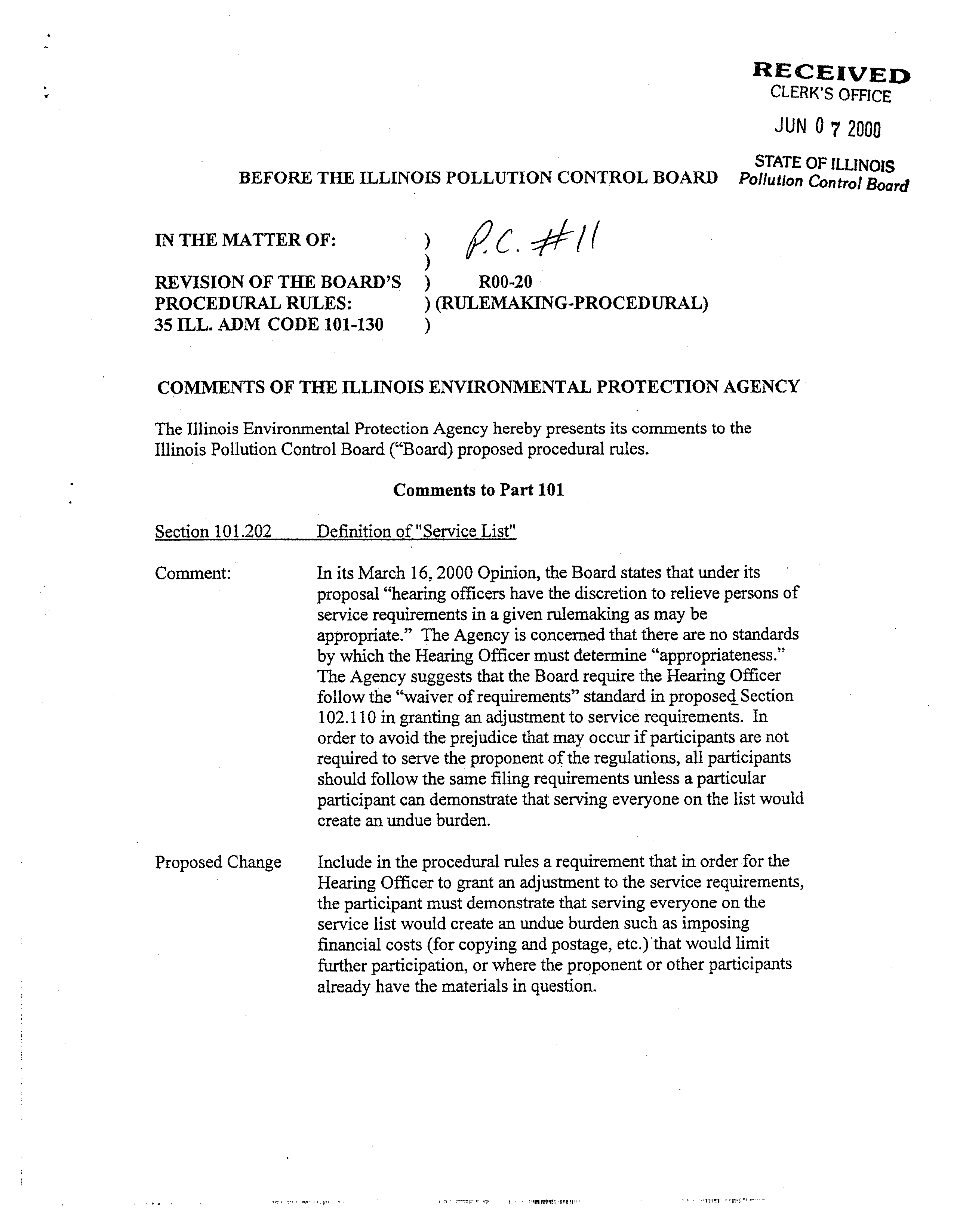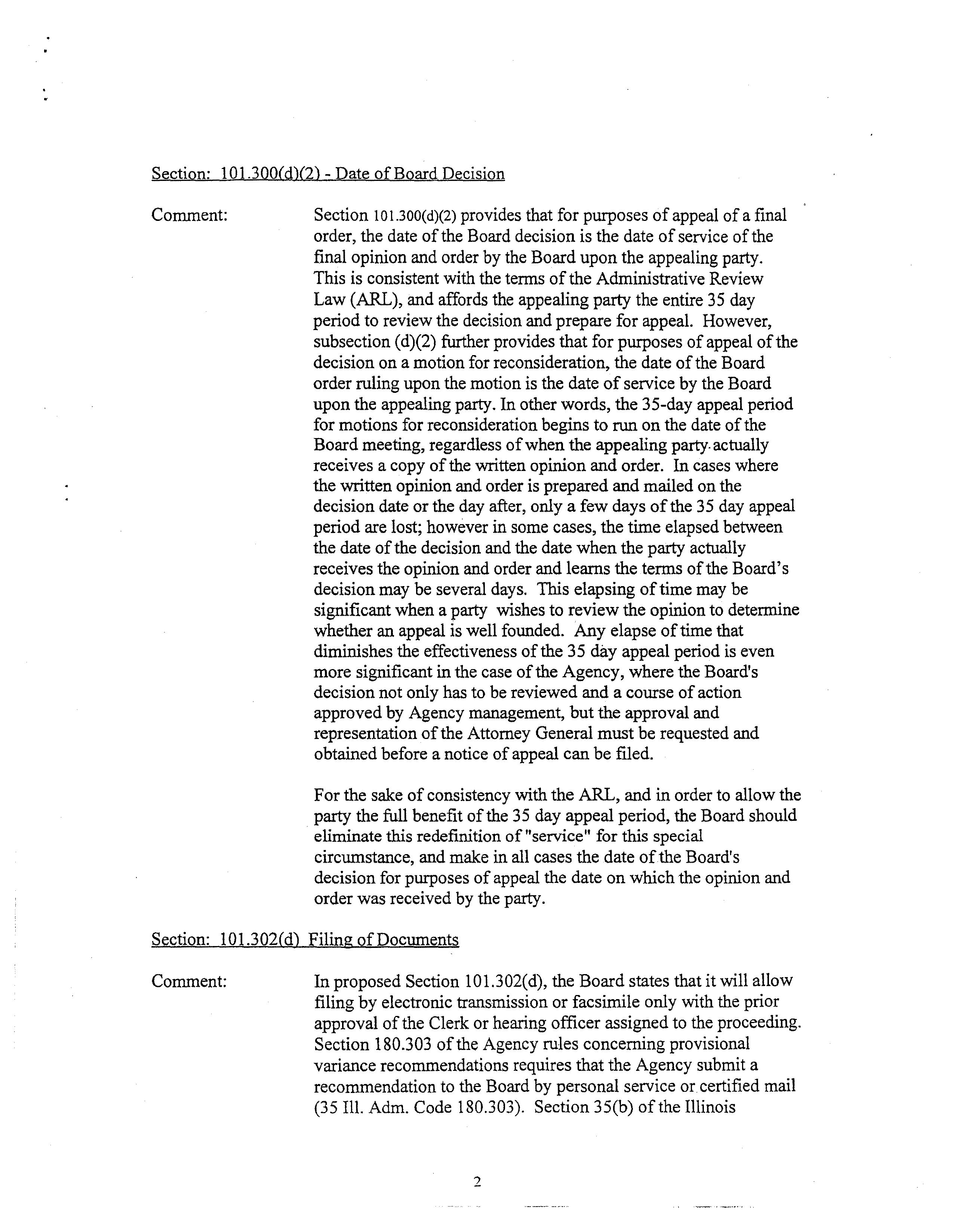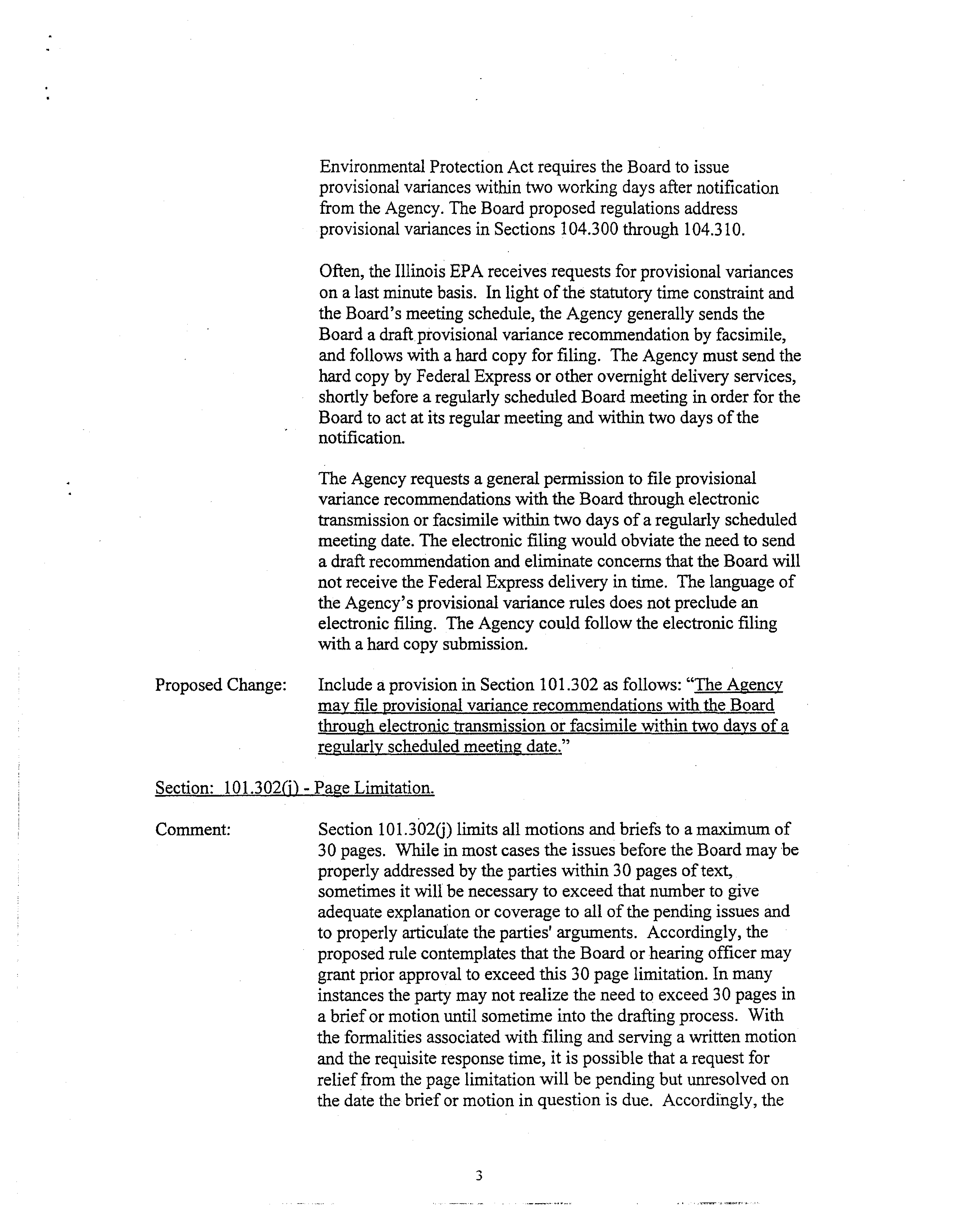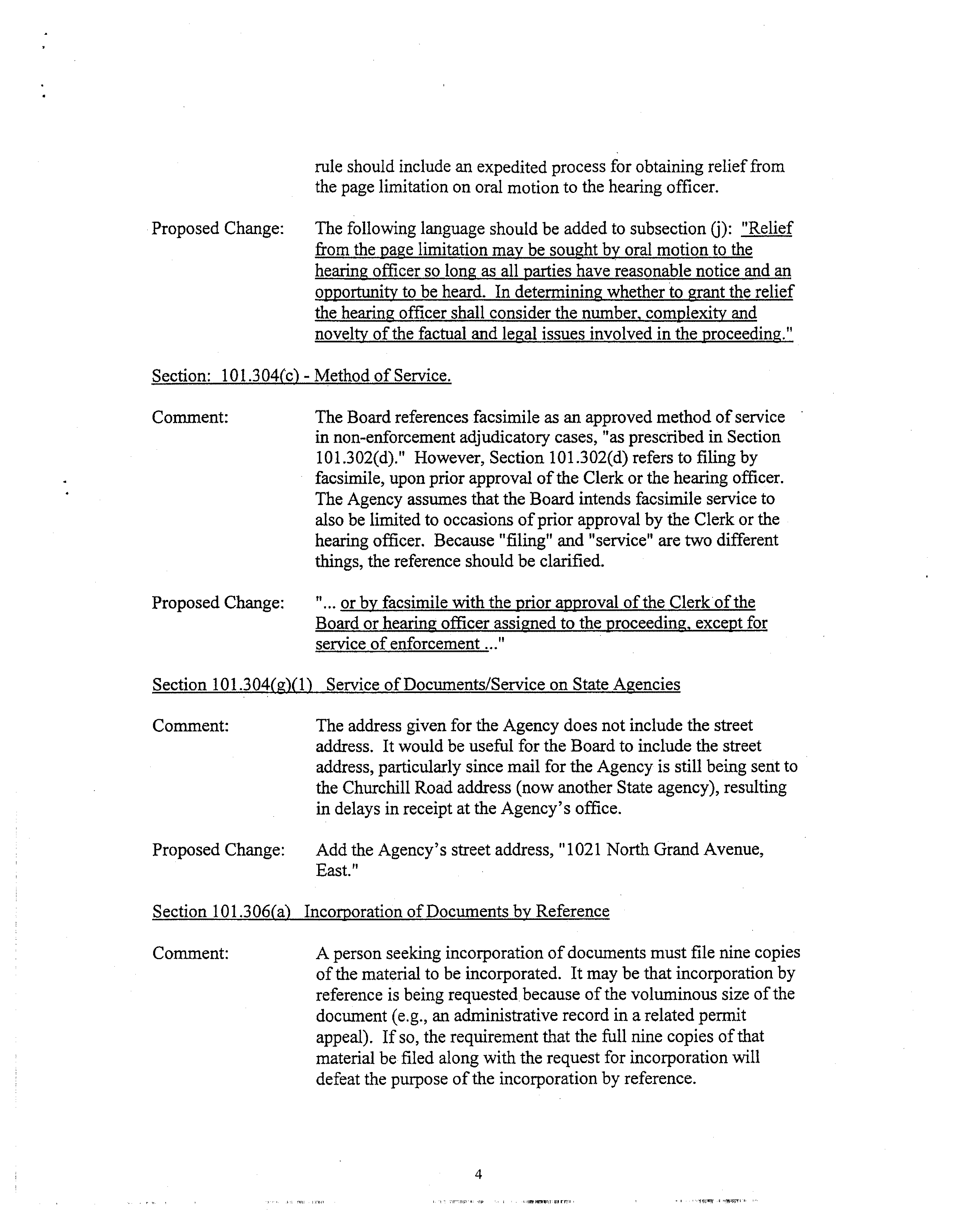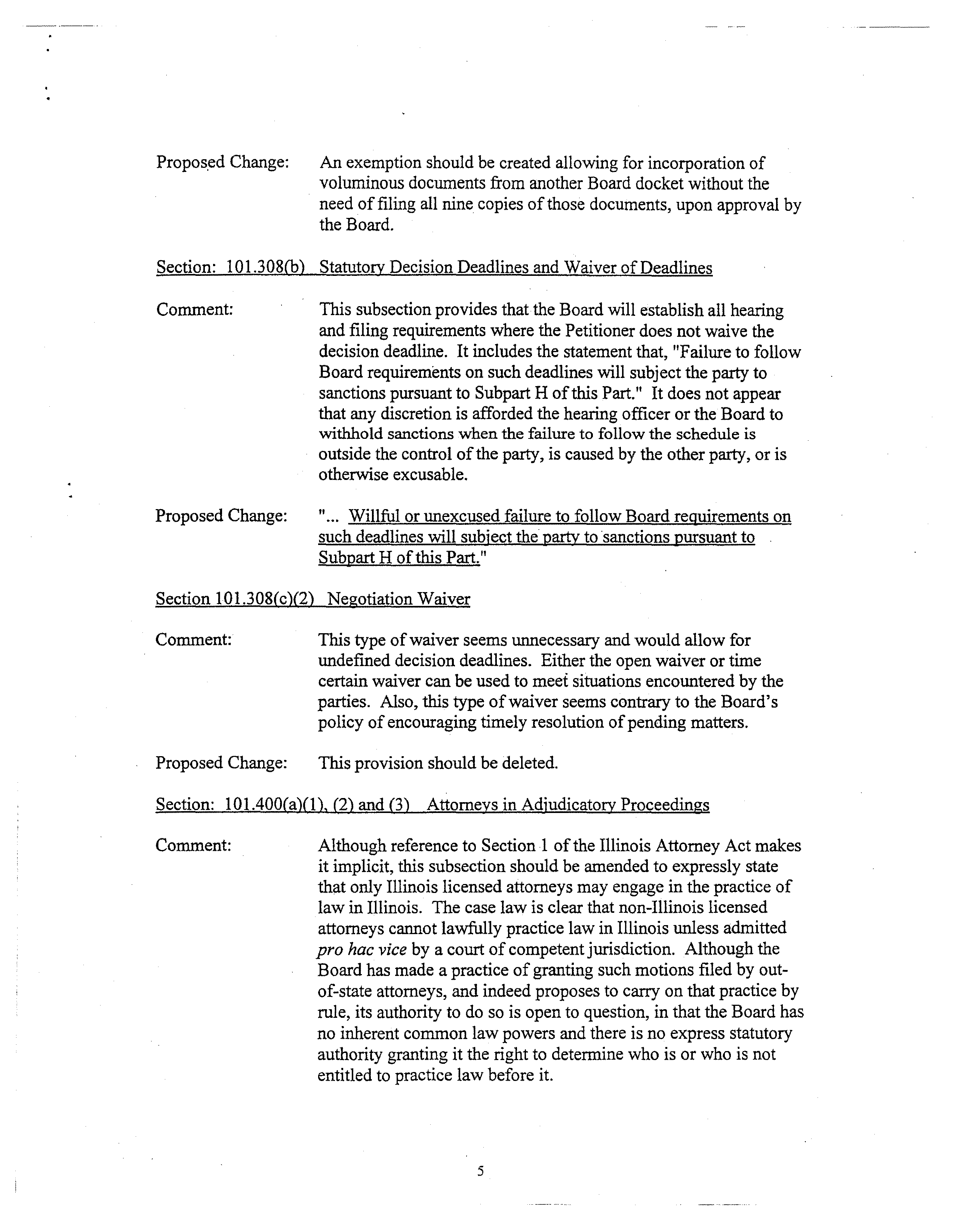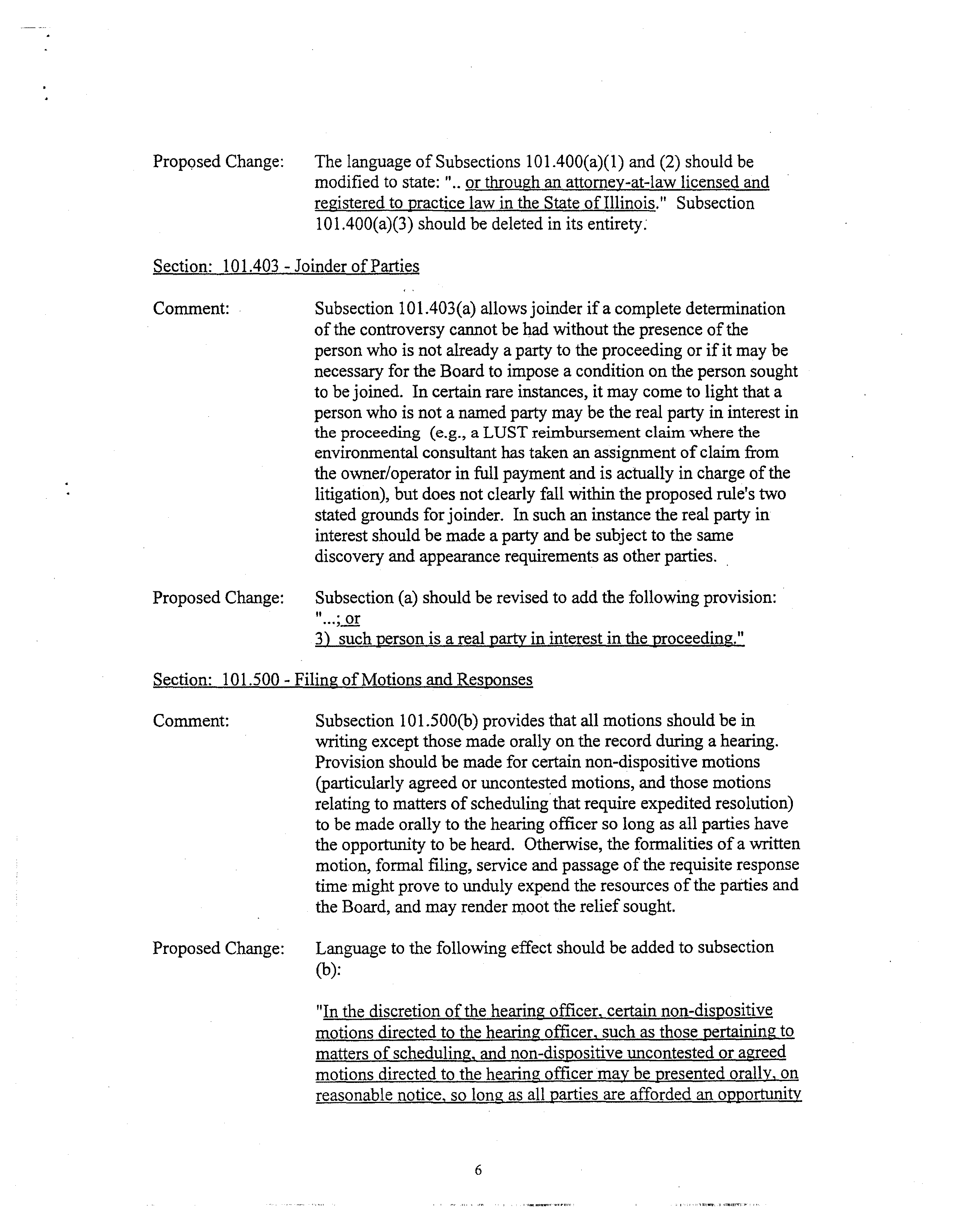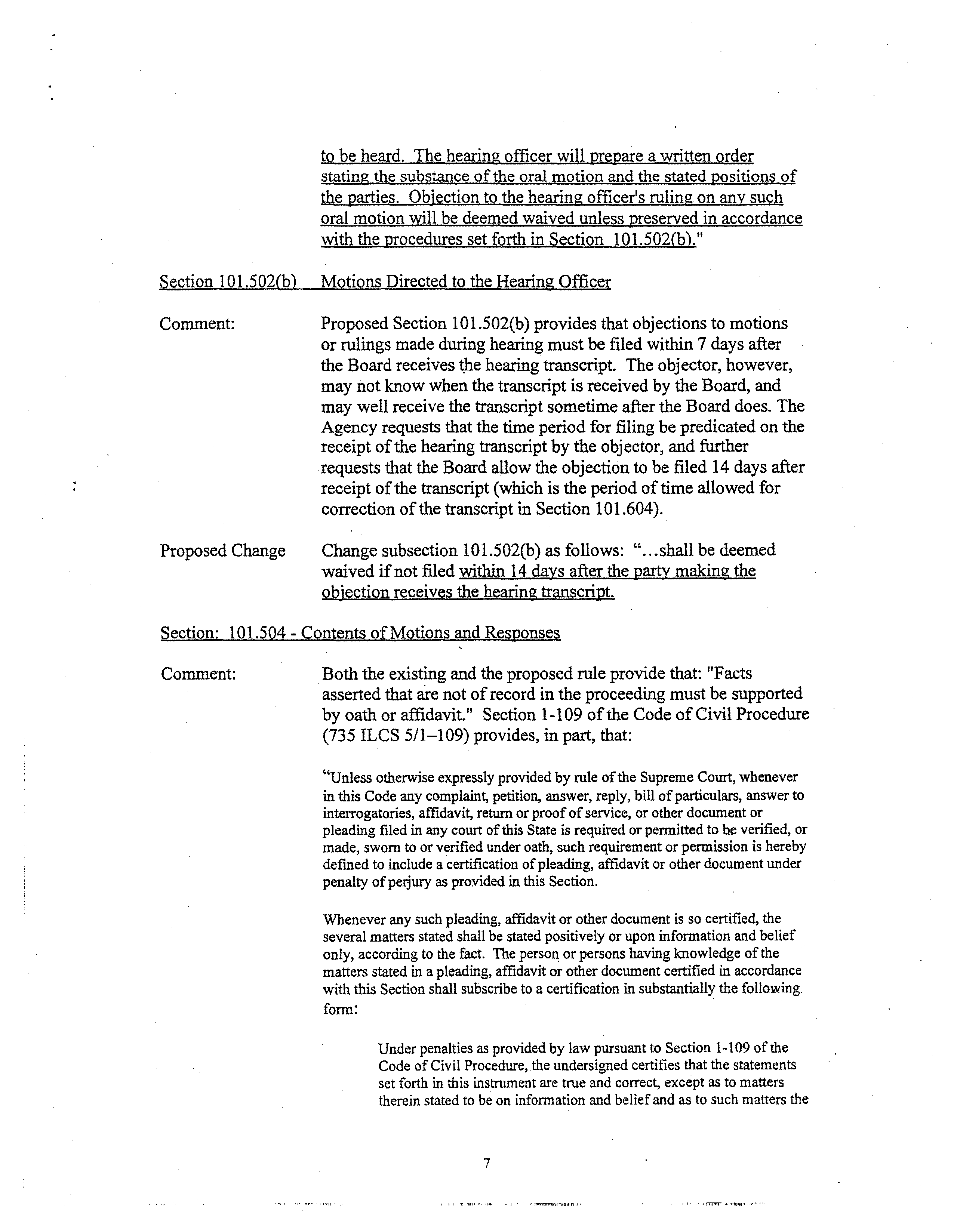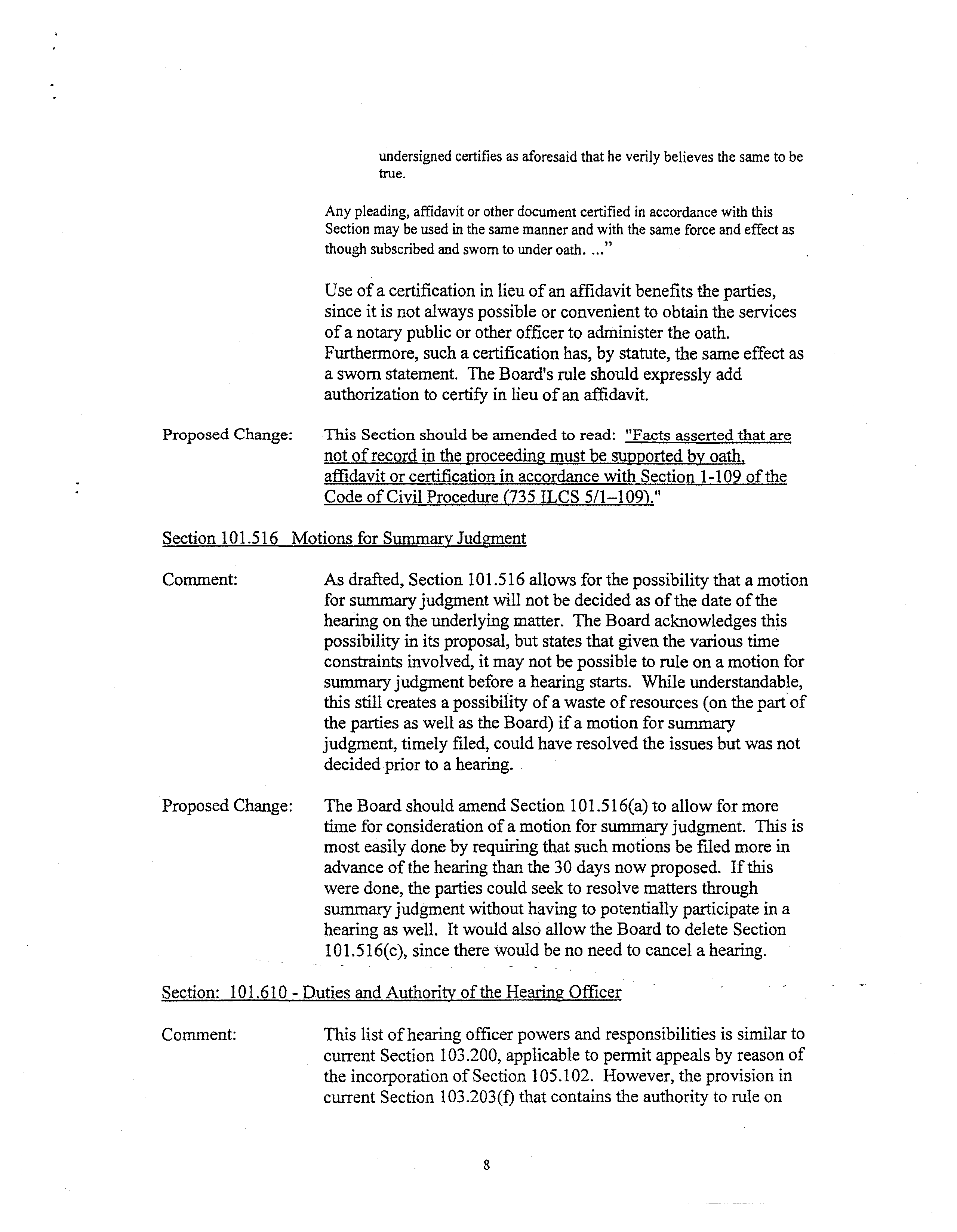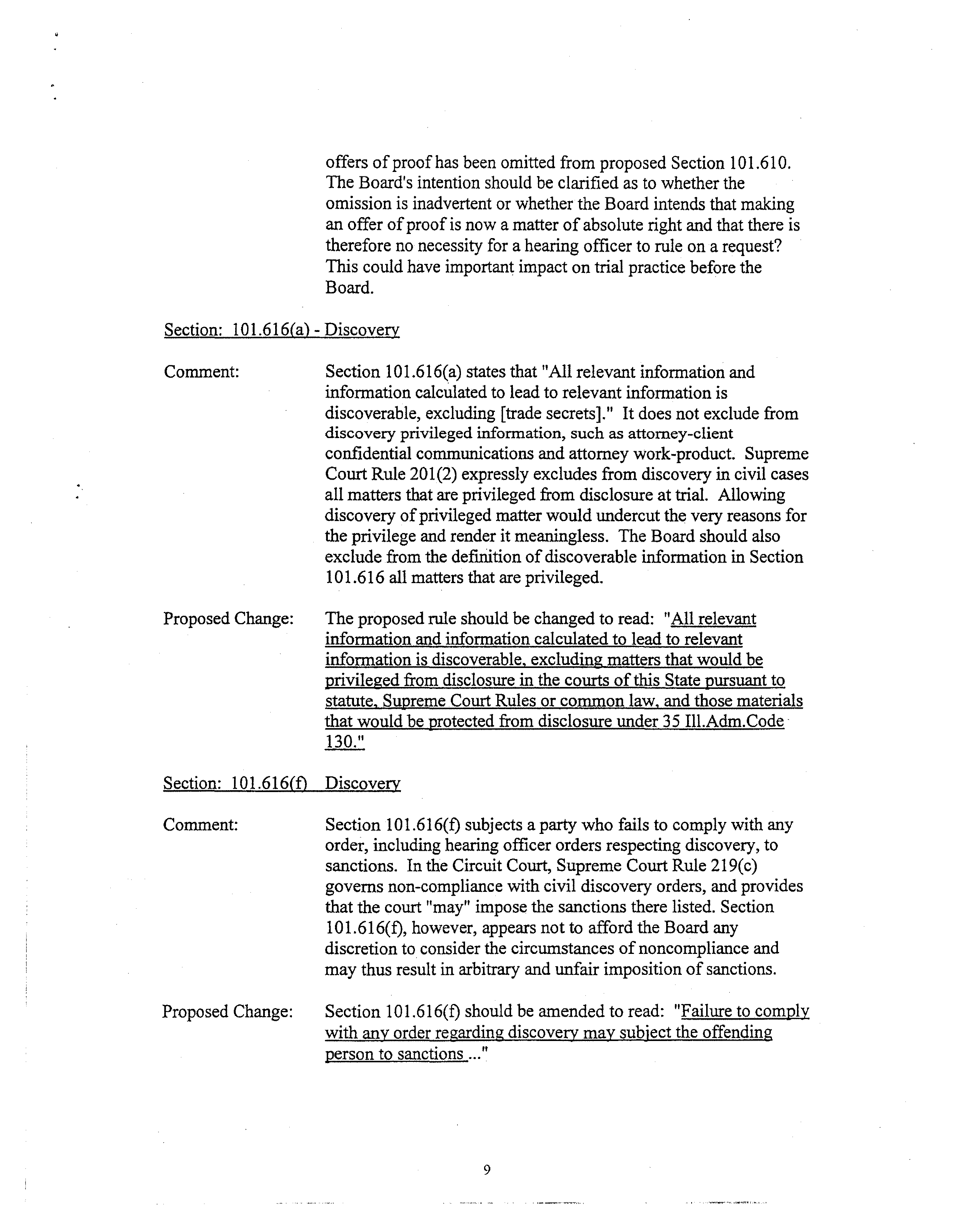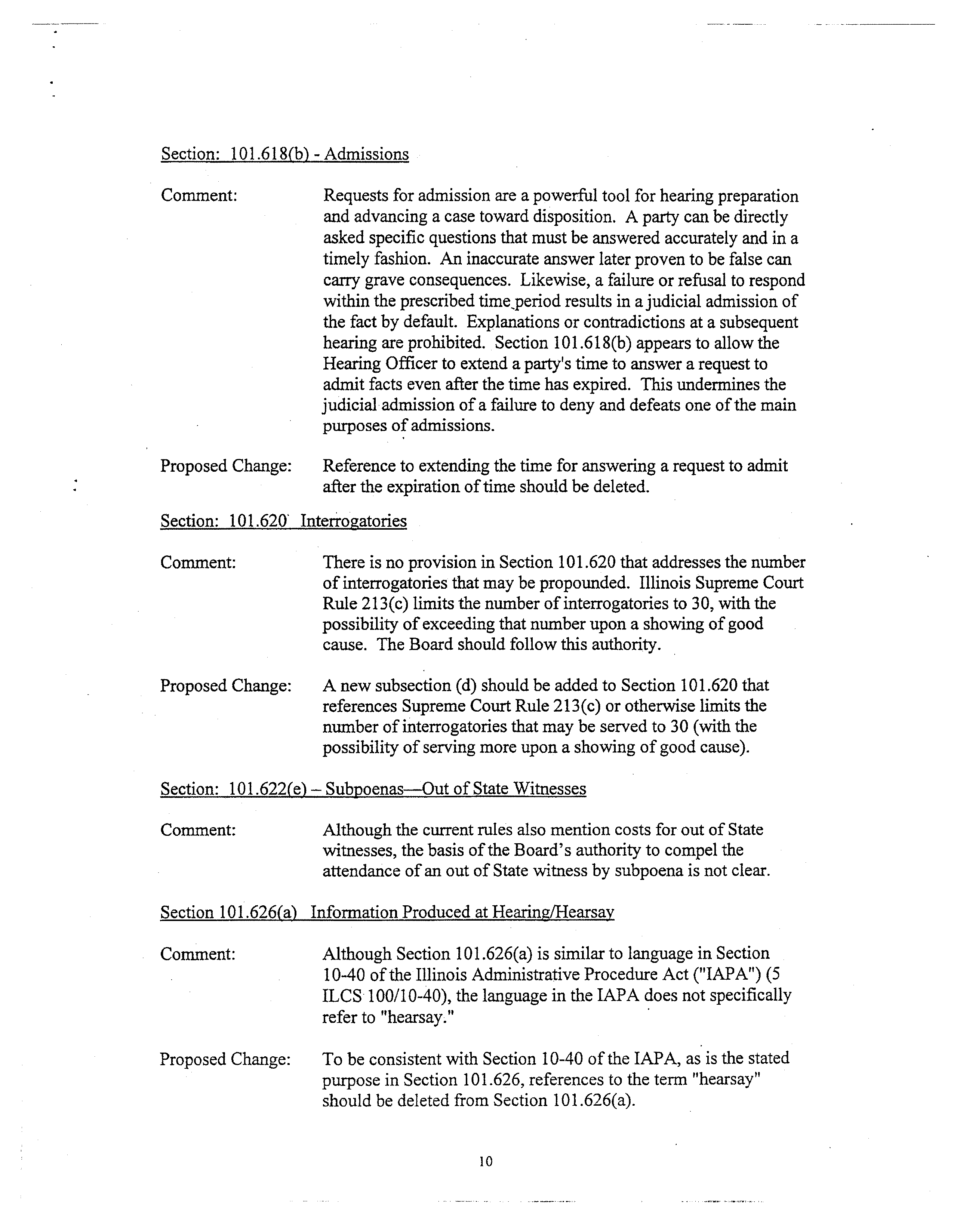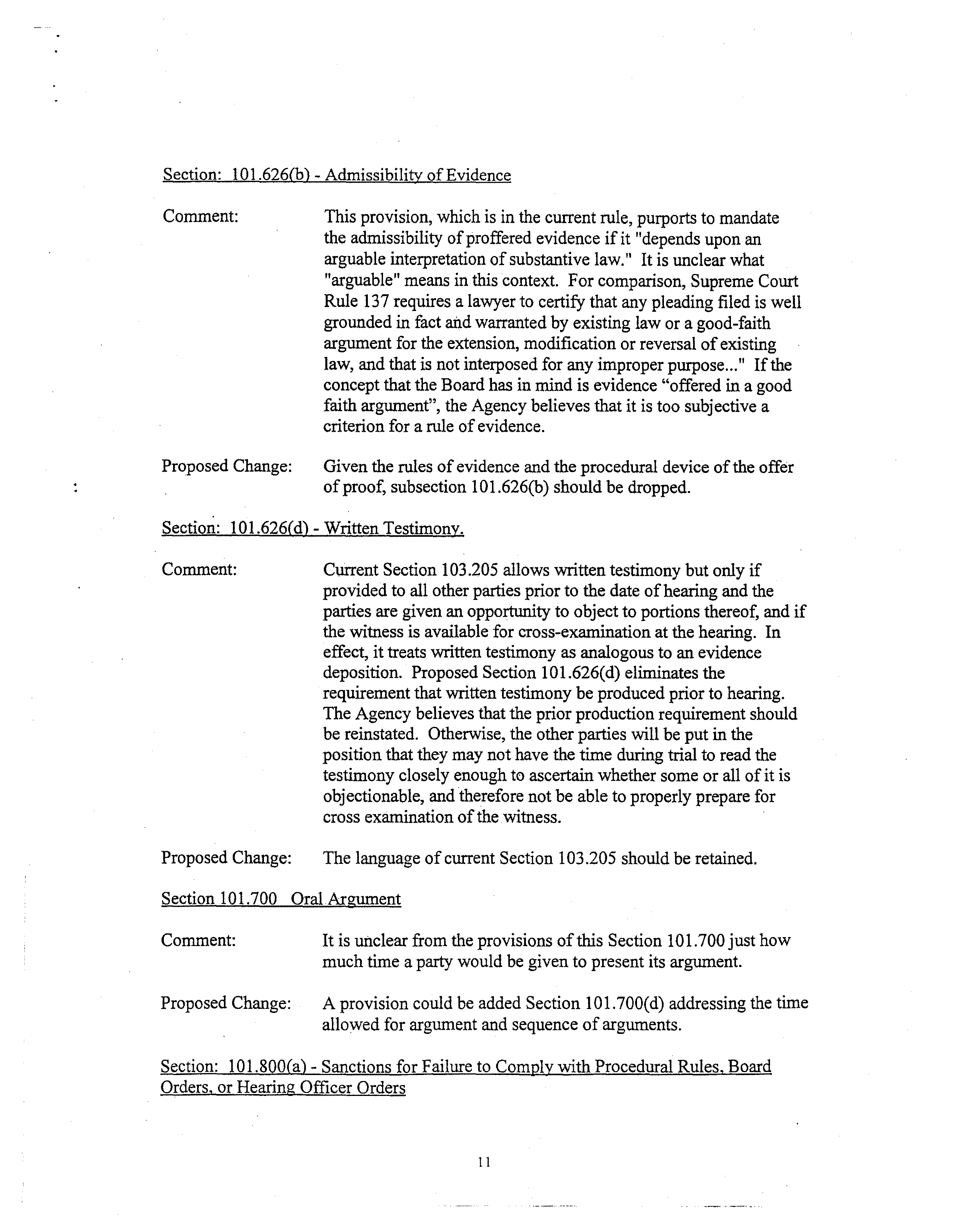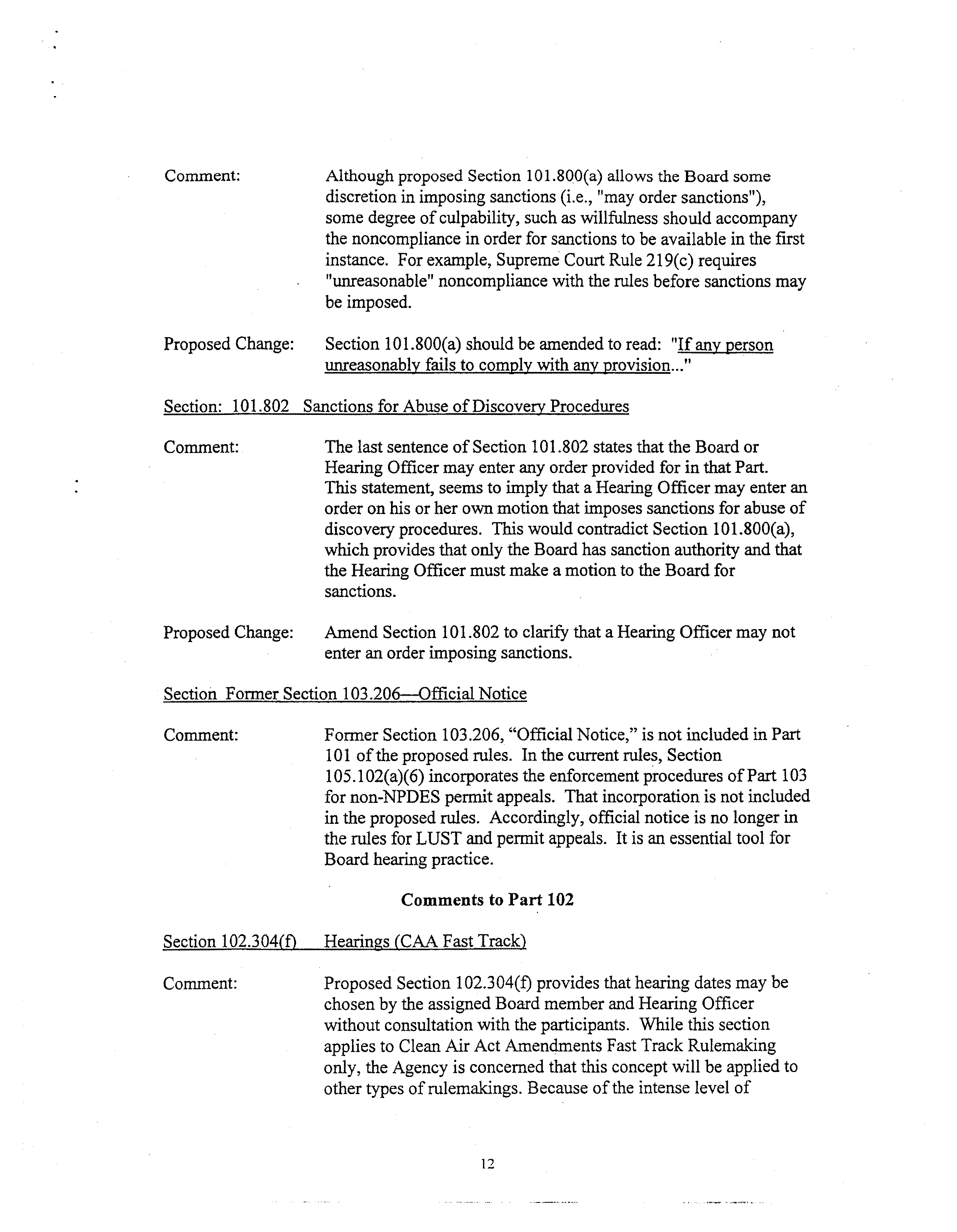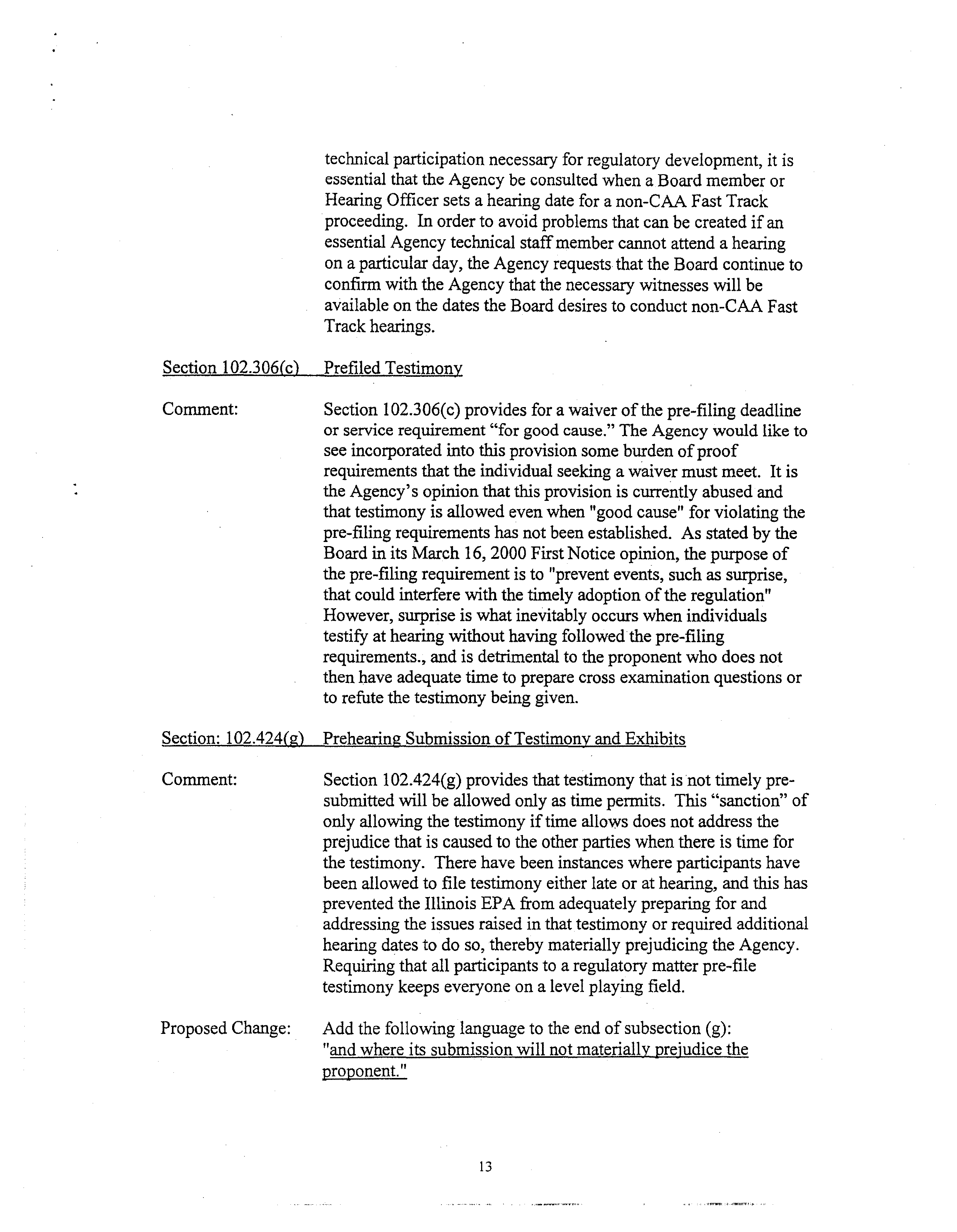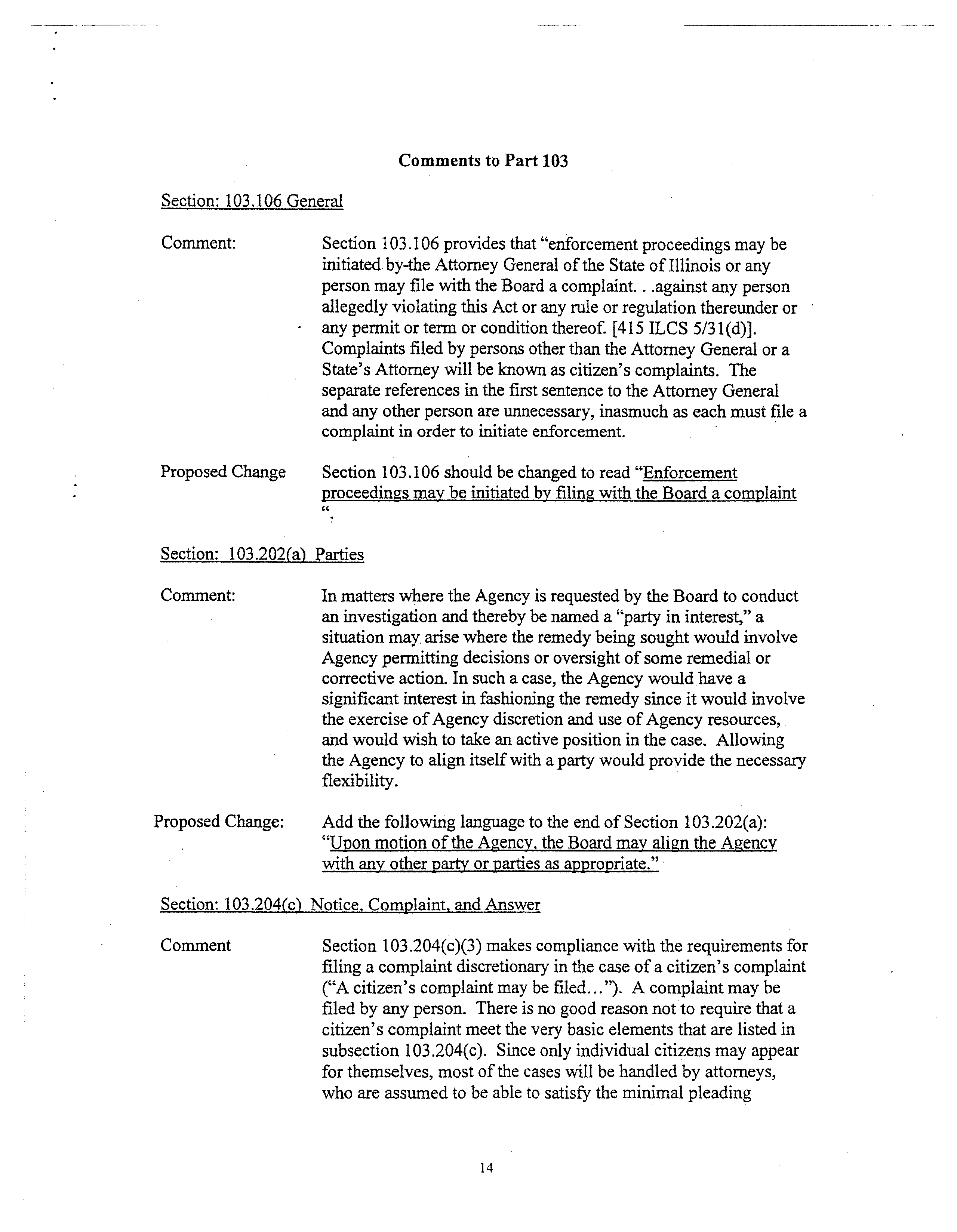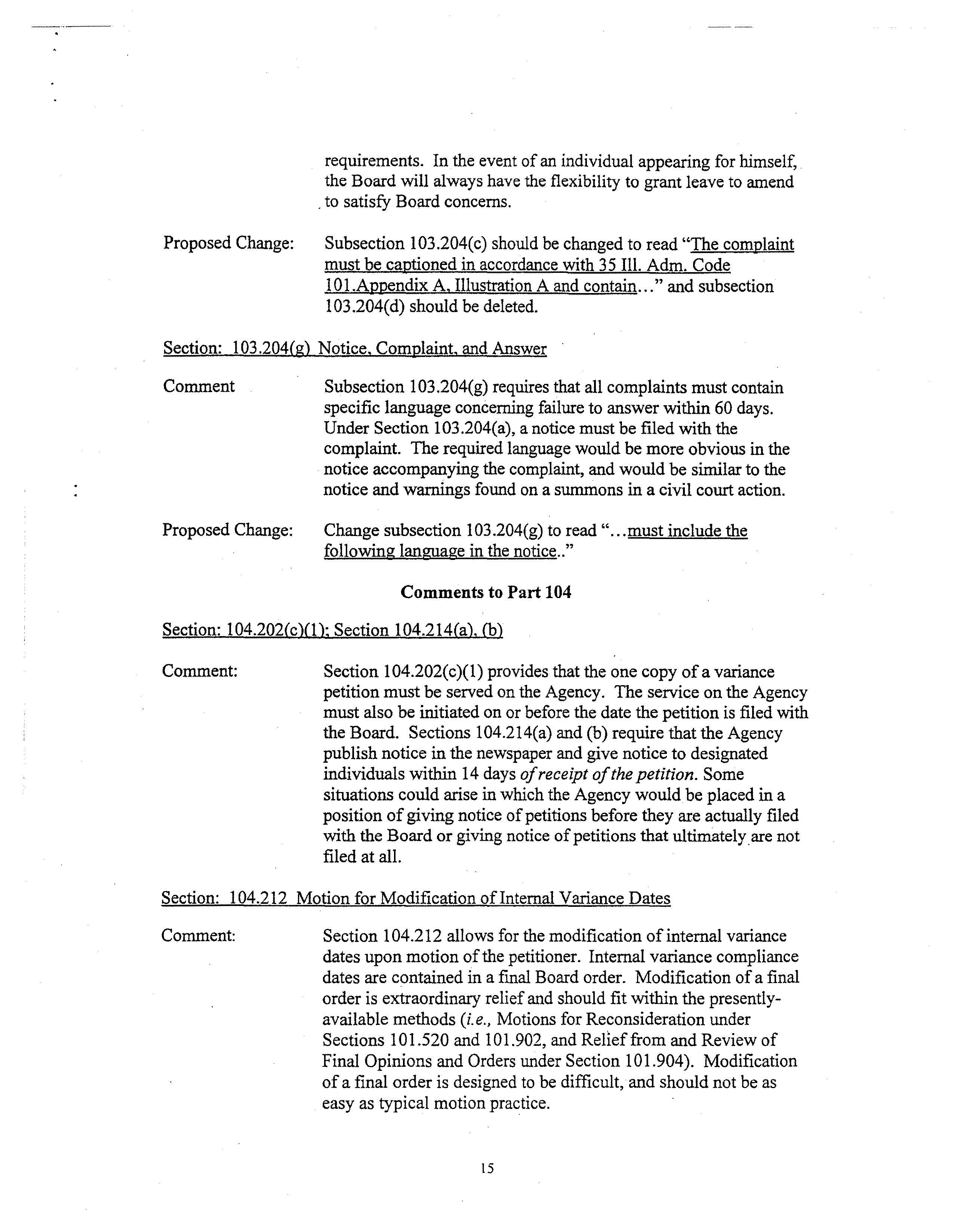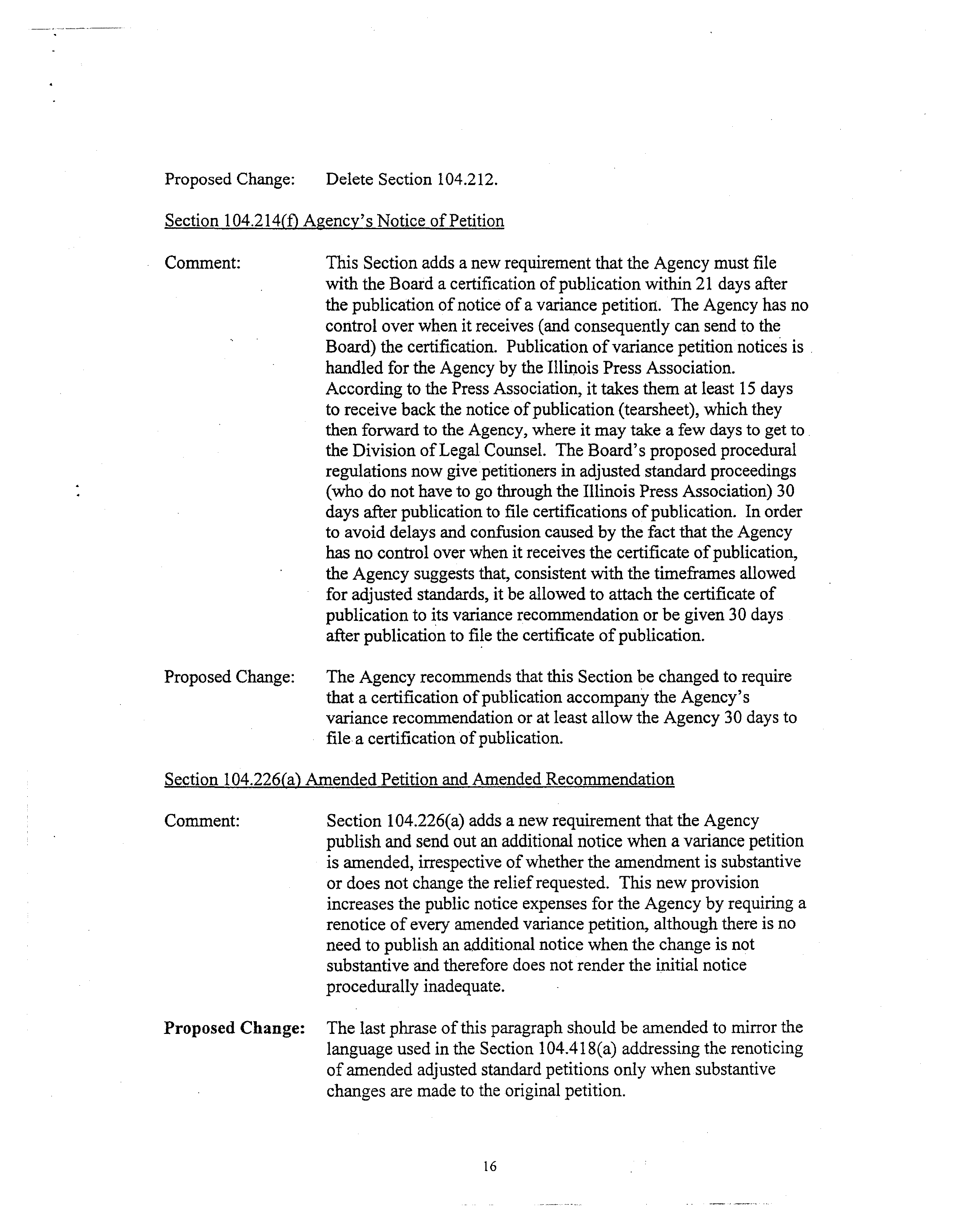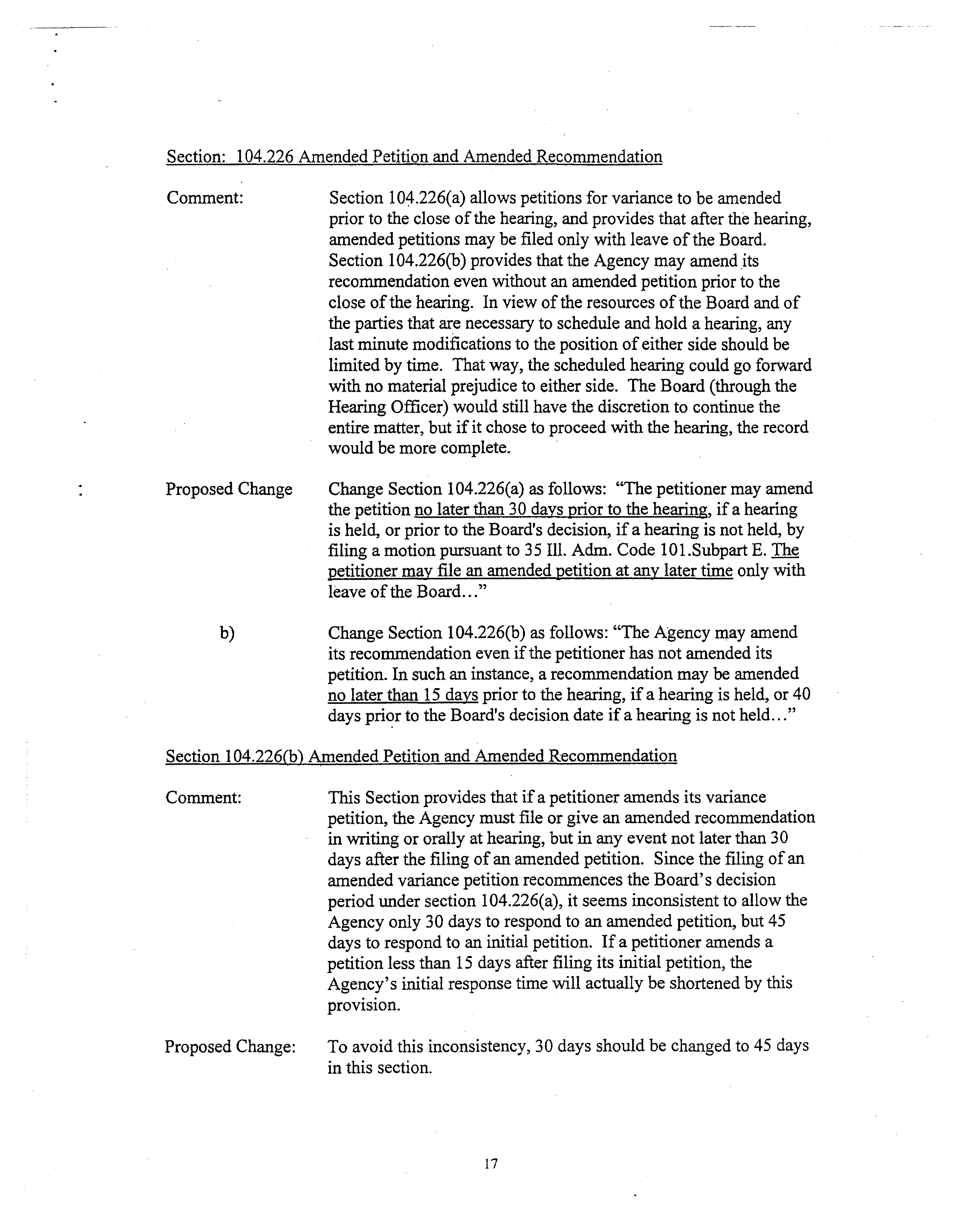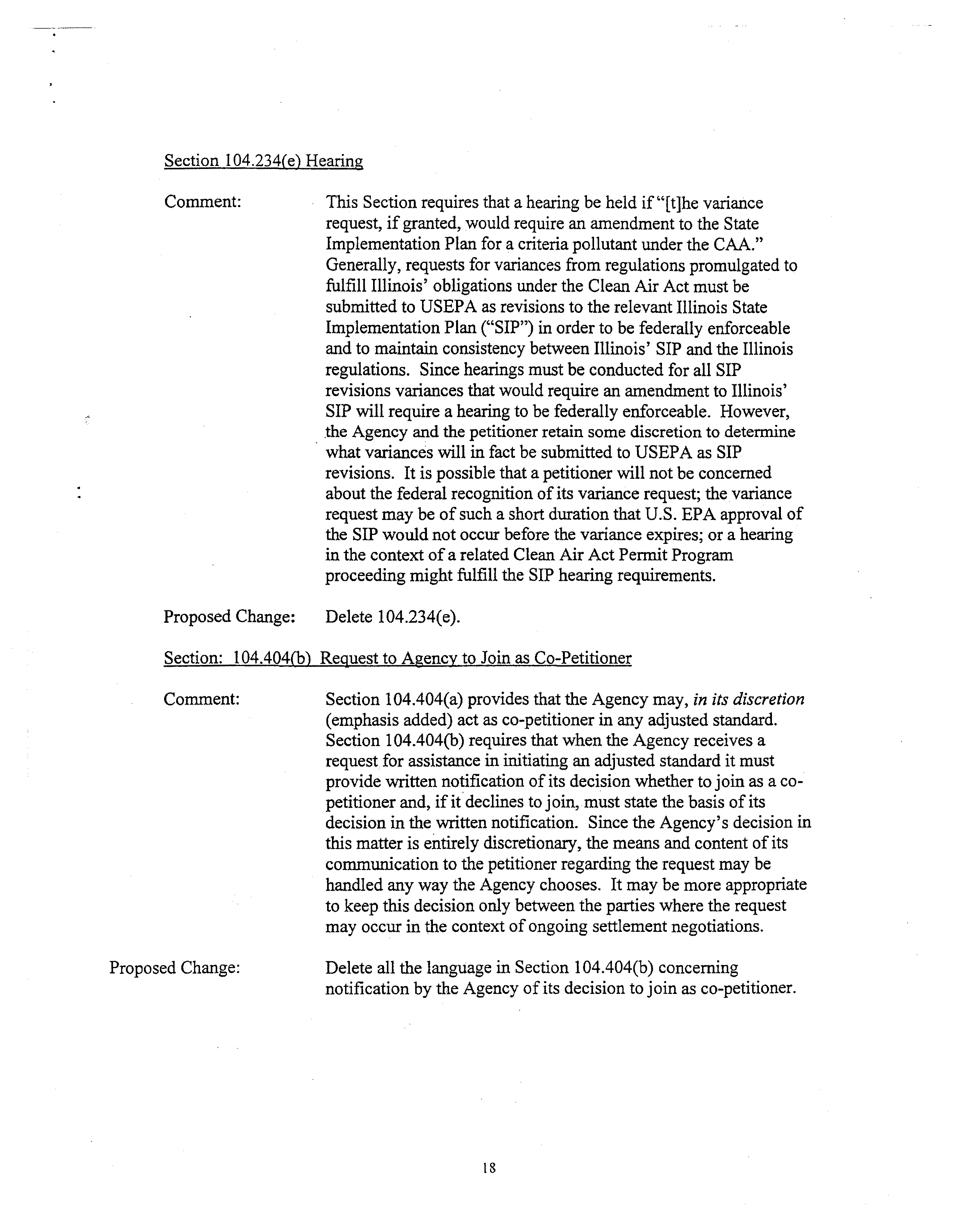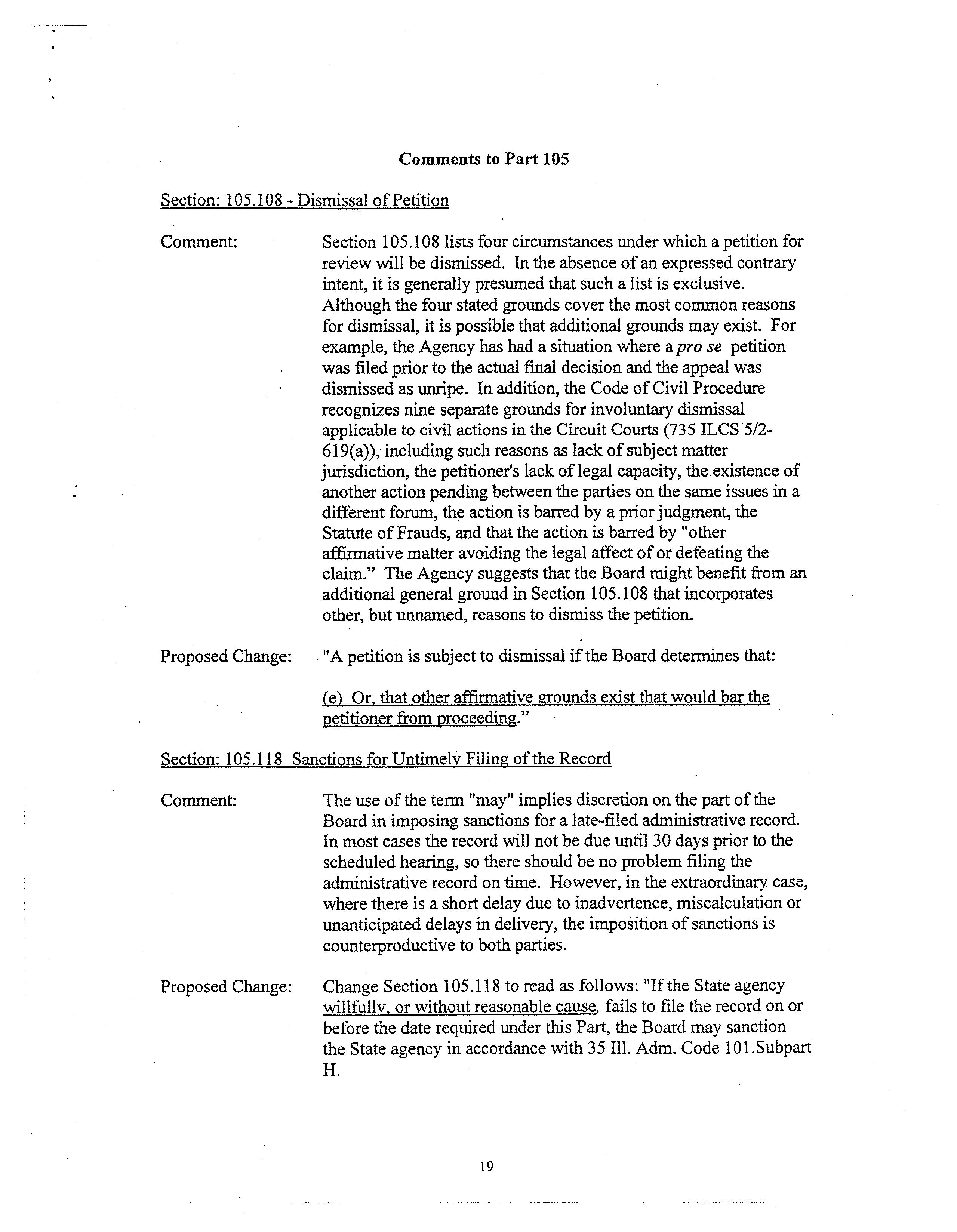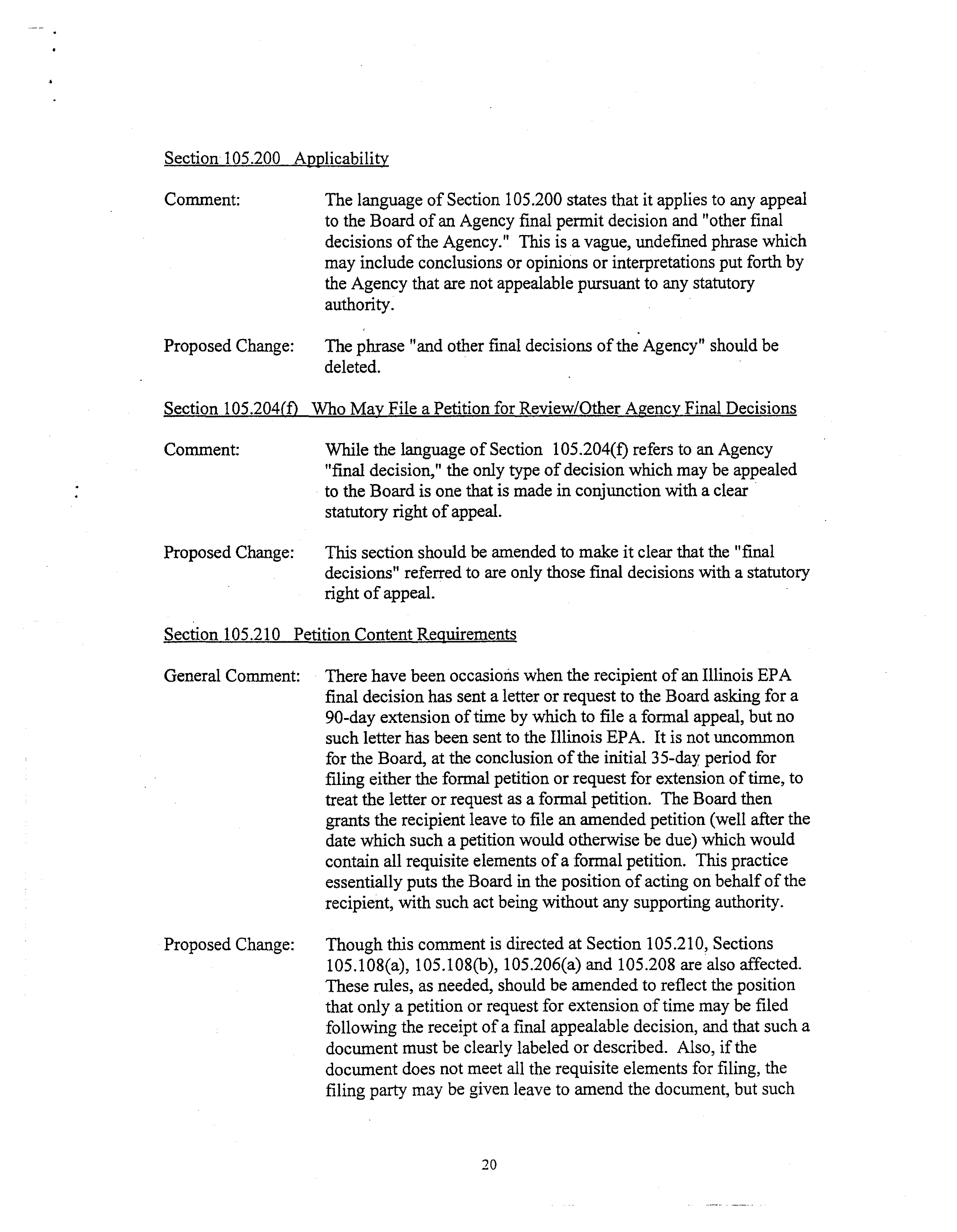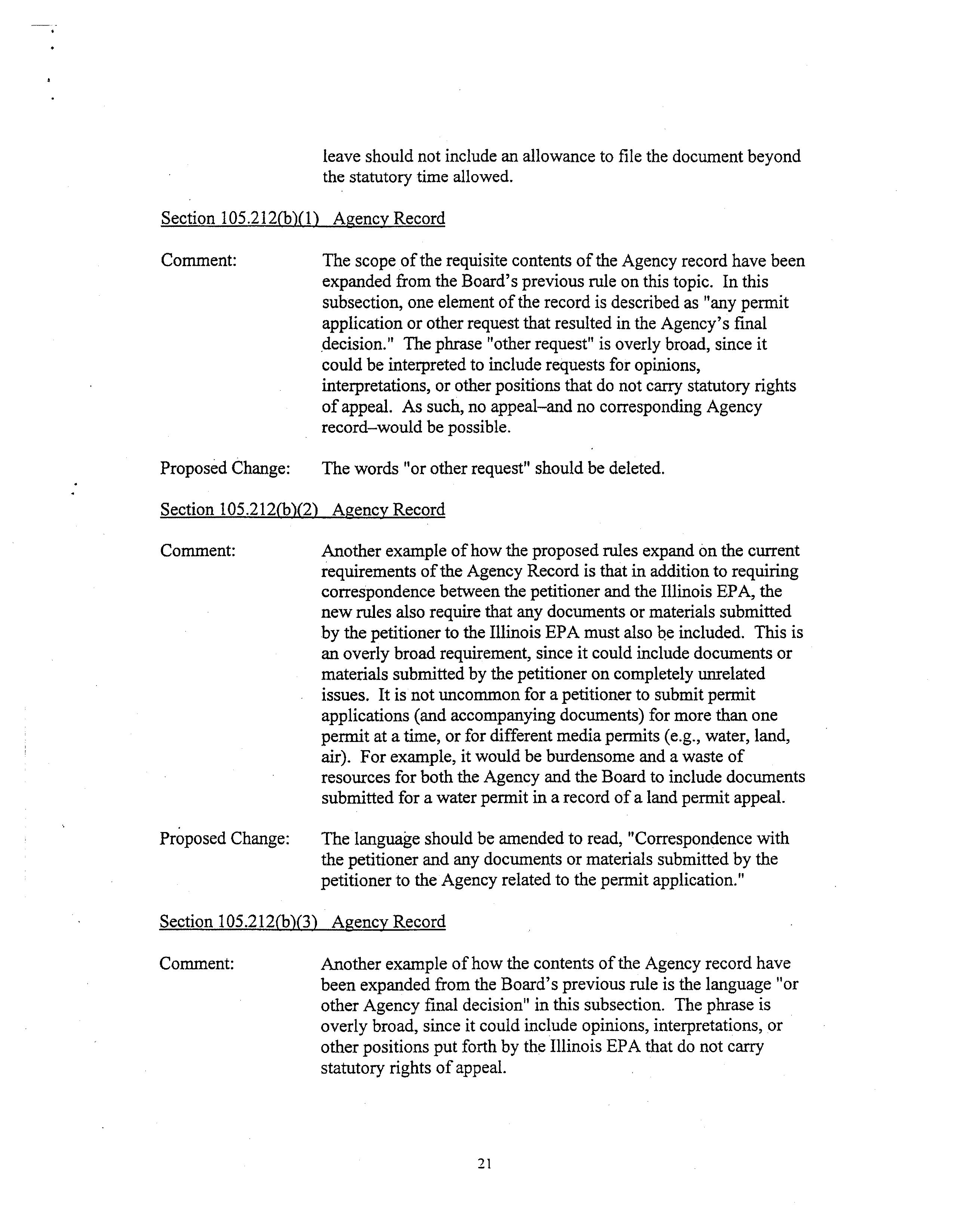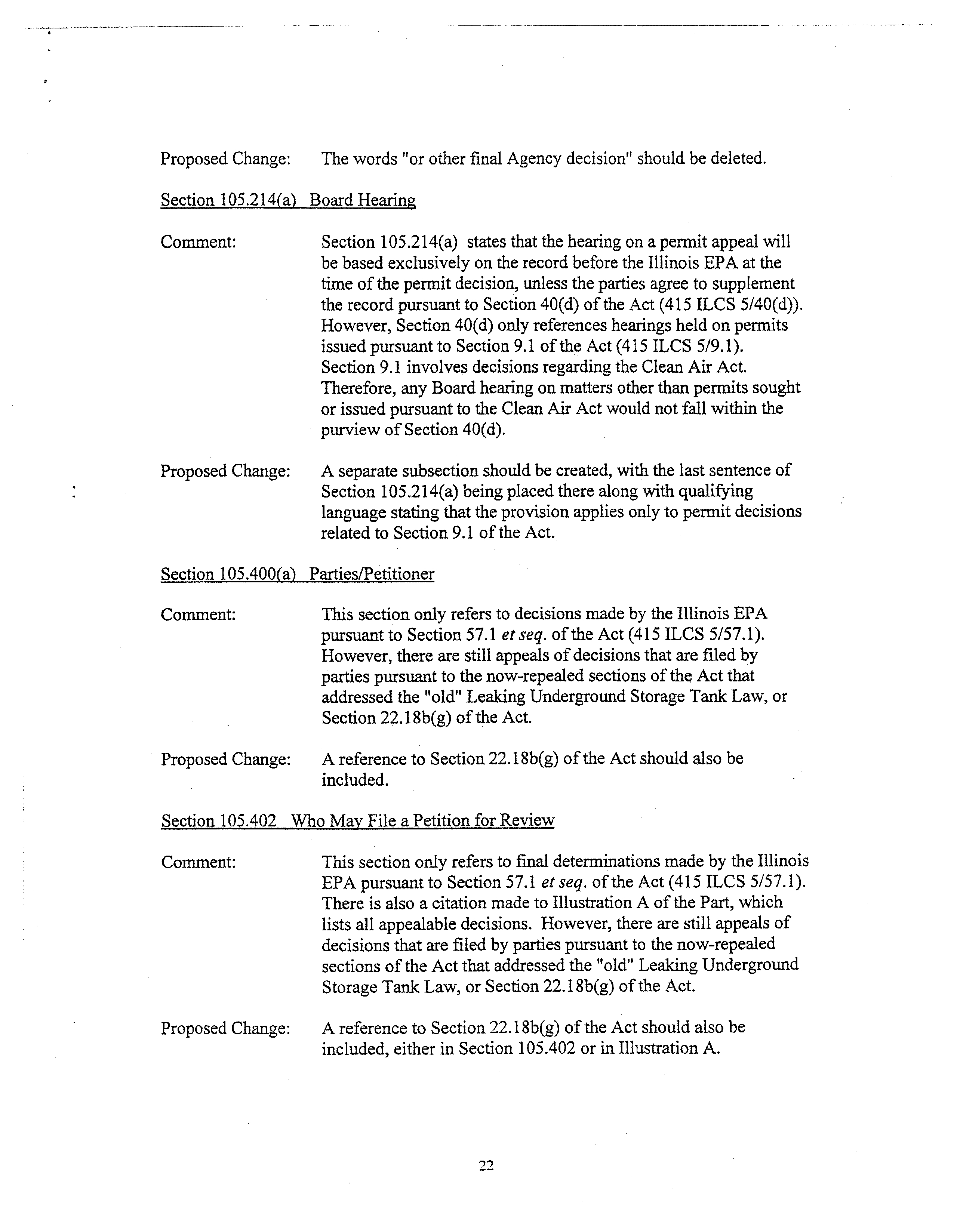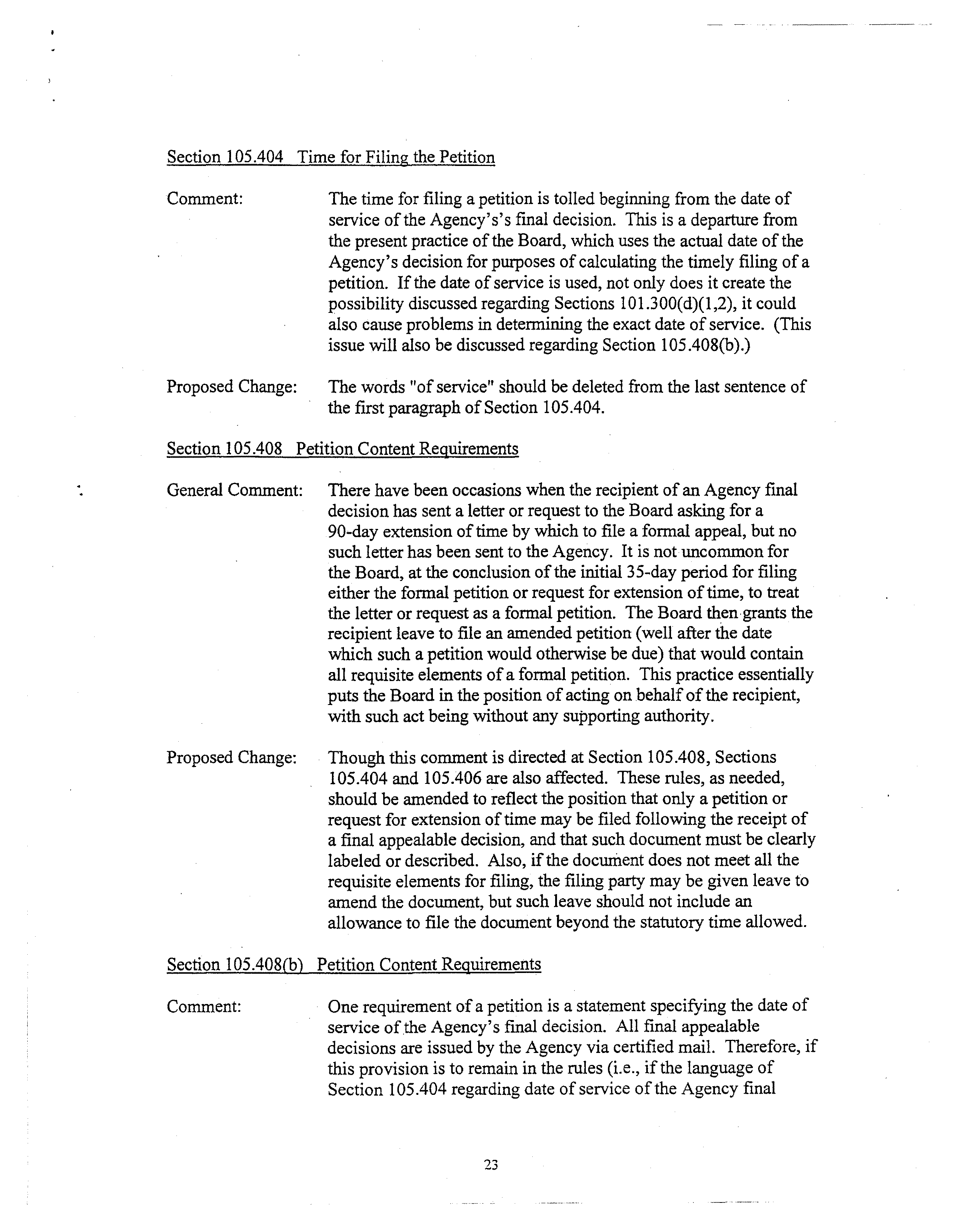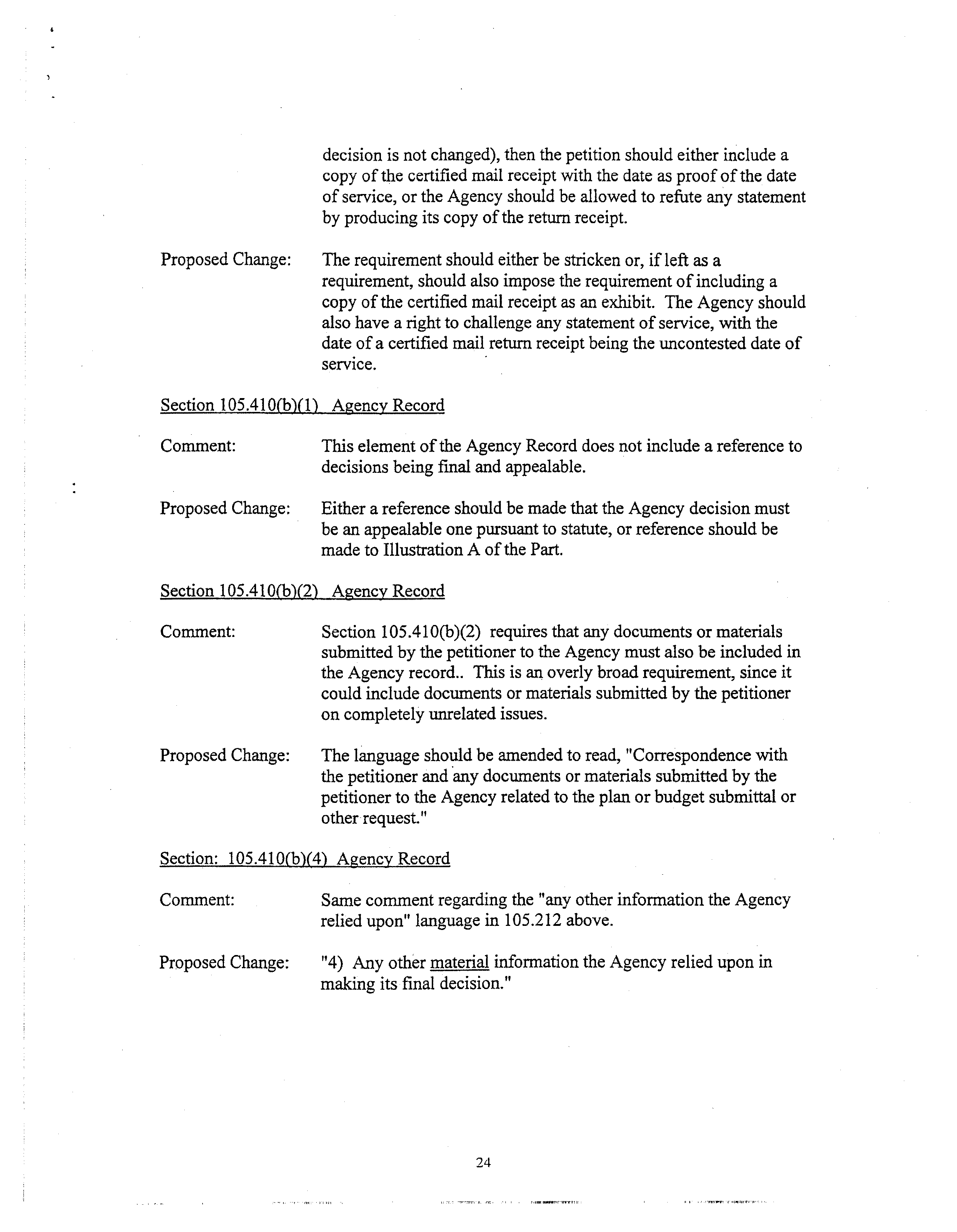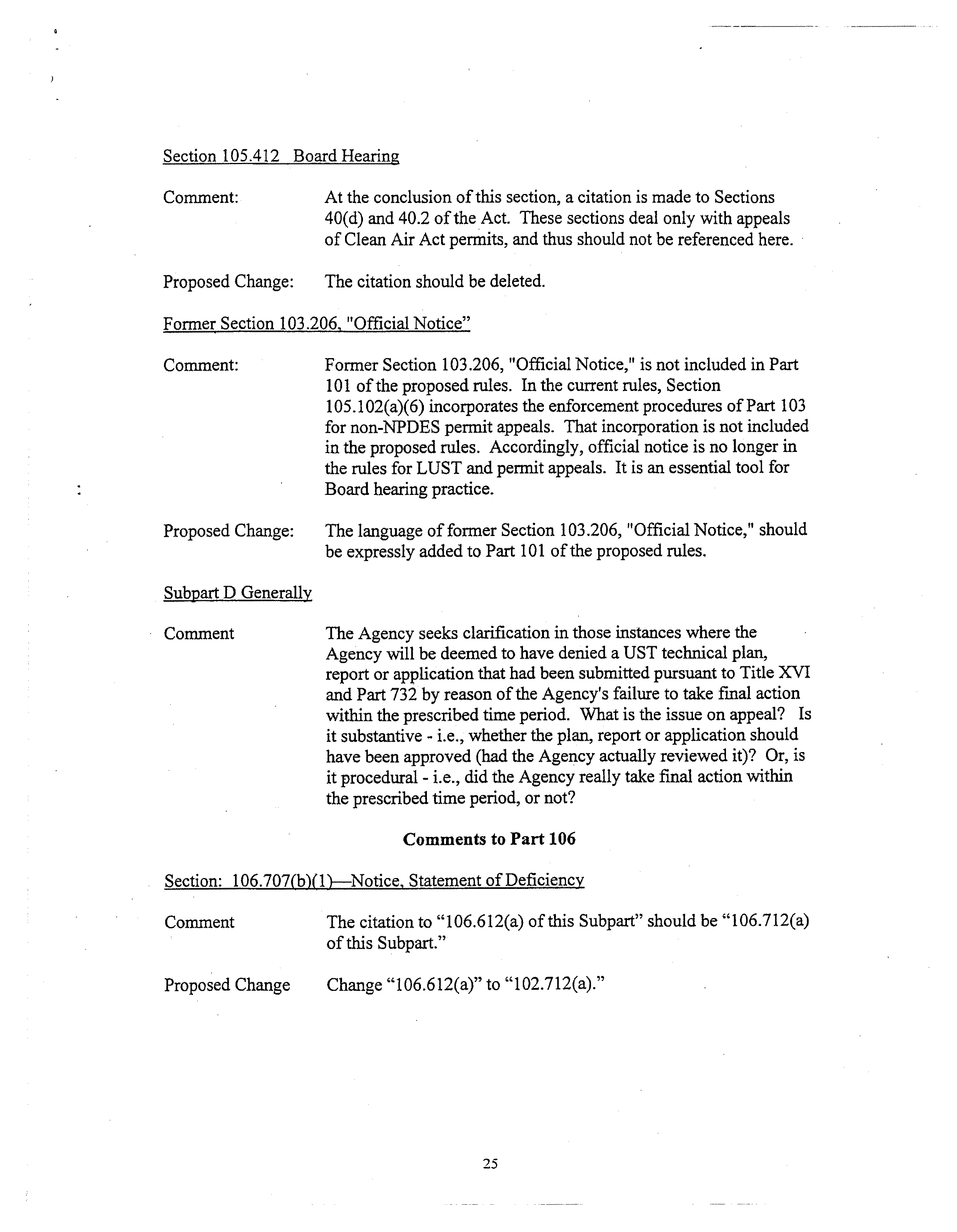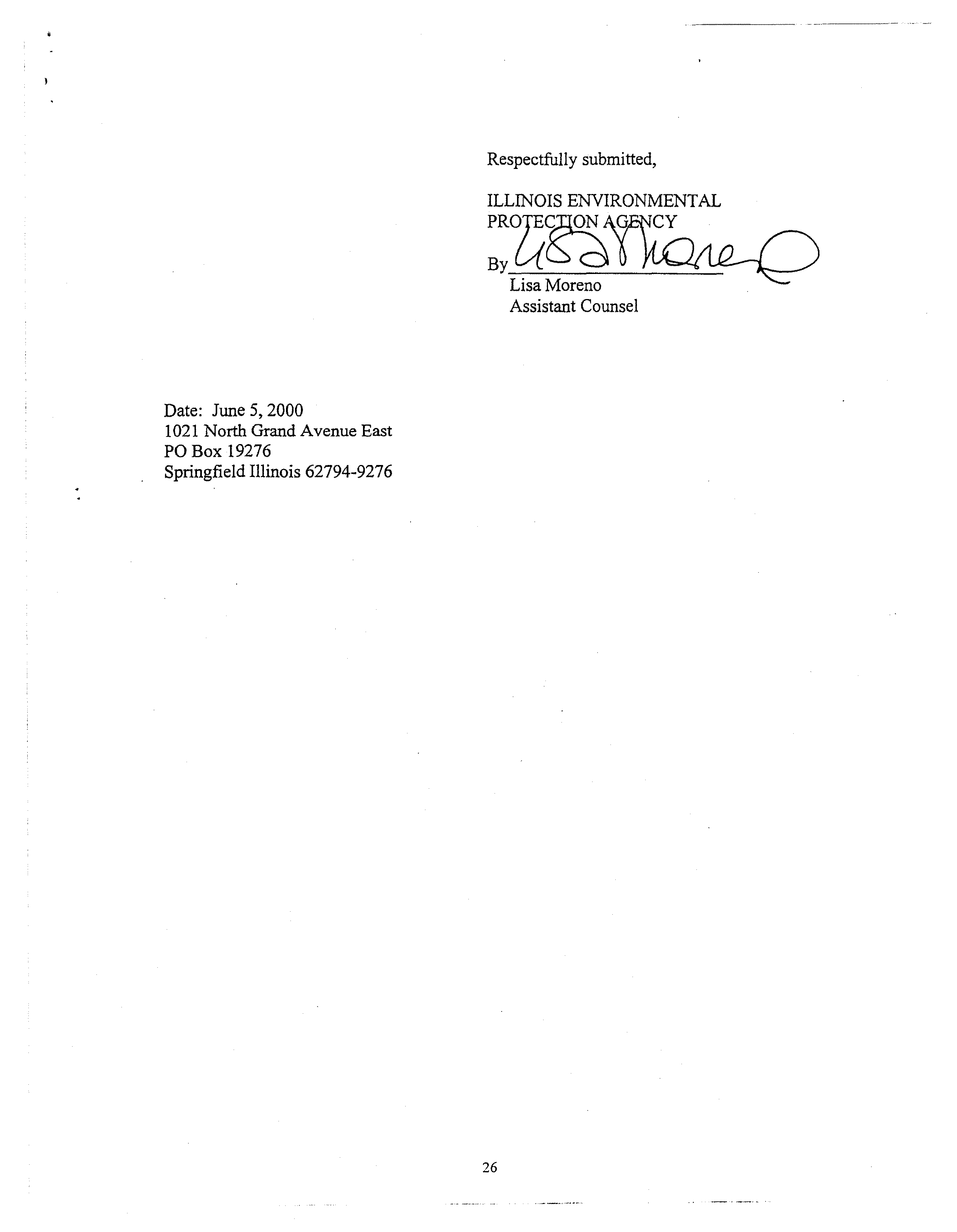RECEIVED
CLERK’S OFFICE
JUN
0
7
2000
STATE
OF ILLINOIS
BEFORE
THE
ILLINOIS POLLUTION CONTROL BOARD
Pollution Control
Board
IN
THE MATTER
OF:
REVISION OF
THE
BOARD’S
PROCEDURAL RULES:
35
ILL. ADM
CODE 101-130
)
R0O-20
)
(RULEMAKING-PROCEDURAL)
)
COMMENTS
OF THE ILLINOIS ENVIRONMENTAL PROTECTION AGENCY
The Illinois Environmental Protection Agency hereby presents its comments to the
Illinois Pollution Control Board (“Board) proposed procedural rules.
Comments to
Part
101
Section
101.202
Definition of “Service List”
In its March 16, 2000 Opinion, the Board states that under its
proposal “hearing officers have the discretion to relieve persons of
service requirements in a given rulemaking as may be
appropriate.”
The Agency is concerned that there are no standards
by which the Hearing Officermust determine “appropriateness.”
TheAgency suggests that the Board require the Hearing Officer
follow the “waiver ofrequirements” standard in proposed Section
102.110 in granting an adjustment to service requirements.
In
order to avoid the prejudice that may occur if participants are not
requiredto
serve the proponent ofthe regulations,
all participants
should follow the same filing requirements unless a particular
participant can demonstrate that serving everyone on the listwould
create an undue burden.
Proposed Change
Include in the procedural rules a requirement that in order for the
Hearing Officer to grant an adjustment to the service requirements,
the participant must demonstrate that serving everyone on the
service list would create an undue burden such as imposing
financial costs (for copying and postage, etc.) that would limit
furtherparticipation, or where the proponent or otherparticipants
already have the materials in question.
Comment:
Section:
l0l.300(d’)(2)
-
Date ofBoard Decision
Comment:
Section
1O1.300(d)(2)
provides that for purposes of appeal of a final
order, the date ofthe Board decision is the date ofservice ofthe
final opinion and order by the Board upon the appealing party.
This is consistent with the terms ofthe Administrative Review
Law (ARL), and affords the appealing party the entire
35 day
period to review the decision and prepare for appeal.
However,
subsection (d)(2) furtherprovides that for purposes of appeal ofthe
decision on a motion forreconsideration, the date ofthe Board
order ruling upon the motion is the date ofservice by the Board
upon the appealing party. In other words, the 35-day appeal period
for motions for reconsideration begins to run on the date of the
Board meeting, regardless ofwhen the appealing party actually
receives a copy ofthe written opinion and order.
In cases where
the written opinion and order is prepared and mailed on the
decision date or the day after, only a few days ofthe 35 day appeal
period are lost; however in some cases, the time elapsed between
the date ofthe decision and the date when the party actually
receives the opinion and order and learns the terms ofthe Board’s
decision may be several days.
This
elapsing oftime may be
significant when a party
wishes to review the opinion to determine
whether an appeal is well founded.
Any elapse oftime that
diminishes the effectiveness ofthe 35
dày appeal period is even
more significant in the case ofthe Agency, where the Board’s
decision not only has to be reviewed and a course ofaction
approved by Agency management, but the approval and
representation ofthe Attorney General must be requested and
obtained before a notice of appeal can be filed.
For the sake ofconsistency with the ARL, and in order to allow the
party the full benefit ofthe 35 day appeal period, the Board should
eliminate this redefinition of“service” for this special
circumstance, and make in all cases the date of the Board’s
decision for purposes of appeal the date on which the opinion and
order was received by the party.
Section:
101 .302(d~Filing of Documents
Comment:
In proposed Section 101.302(d), the Board states that itwill allow
filing by electronic transmission or facsimile only with the prior
approval ofthe Clerk or hearing officer assigned to the proceeding.
Section
180.303 ofthe Agency rules
concerning provisional
variance recommendations requires that the Agency submit a
recommendation to the Board by personal service or certified mail
(35 Ill.
Adm. Code 180.303).
Section 35(b) ofthe Illinois
Environmental Protection Act requires the Board to
issue
provisional variances within two working days after notification
from the Agency. The Board proposed regulations
address
provisional variances in
Sections 104.300 through
104.3 10.
Often, the Illinois EPA receives requests for provisional variances
on a last minute basis.
In light ofthe statutory time constraint and
the Board’s meeting schedule, the Agency
generally sends the
Board a draftprovisional variance recommendation by facsimile,
and follows with a hard copy for filing.
The Agency must send the
hard copy by Federal Express or other overnight delivery services,
shortly before a regularly scheduled Board meeting in order for the
Board to
actat its regular meeting and within two days of the
notification.
The Agency requests a general permission to file provisional
variance recommendations with the Board through electronic
transmission or facsimile withintwo days of a regularly scheduled
meeting date. The electronic filing would obviate the need to send
a draft recommendationand eliminate concernsthat the Board will
not receive the Federal Express delivery in time.
The language of
the Agency’s provisional variance rules does not preclude an
electronic filing.
The Agency could follow the electronic
filing
with a hard copy submission.
Proposed Change:
Include a provision in Section
101.302 as follows: “The Agency
may file provisional variance recommendations with the Board
through electronic transmission or facsimile within two days ofa
regularly scheduled meeting date.”
Section:
101.302(i)
-
Page Limitation.
Comment:
Section
101.302(j) limits all motions and briefs to
a maximum of
30 pages.
While in most cases the issues before the Board may be
properly addressed by the parties within 30 pages oftext,
sometimes it will be necessary to exceed that number to give
adequate explanation or coverage to all
ofthe pending issues
and
to properly articulate the parties’ arguments.
Accordingly, the
proposed rule contemplates that the Board
or hearing officermay
grant prior approval to exceed this 30 page limitation. In many
instances the party maynot realize the need to
exceed 30 pages
in
a briefor motion until sometime into the drafting process.
With
the formalities associated with filing and serving
a written motion
and the requisite response time, it is possible that a request for
relief from the page limitationwill be pending but unresolved on
the date the briefor motion in question is due.
Accordingly, the
rule should include an expedited process for obtaining relieffrom
the page limitation on oral motion to
the hearing officer.
Proposed Change:
The following language should be added to
subsection
a):
“Relief
from the p~ge
limitation may be sought b~
oral motion to the
hearing officer so long as all parties have reasonable notice and an
opportunity to be heard.
In determining whether to
grant the relief
the hearing officer shall consider the number, complexity and
novelty of the factual and legal issues involved
in the proceeding.”
Section:
101.304(c)
-
Method ofService.
Comment:
The Board references facsimile as an approved method ofservice
in non-enforcement adjudicatory cases,
“as prescribed in Section
101.302(d).”
However, Section 101.302(d) refers to filing by
facsimile, upon prior approval ofthe Clerk or the hearing officer.
The Agency assumes that the Board intends facsimile service to
also be limited to occasions ofprior approval by the Clerk or the
hearing officer.
Because “filing” and “service” are two different
things, the reference should be clarified.
Proposed Change:
“...
or by facsimile with the prior approval ofthe Clerkofthe
Board or hearing officer assigned to the proceeding, except for
service ofenforcement
Section
101 .304(g)(1)
Service ofDocuments/Service on State Agencies
Comment:
The address given for the Agency does not include the street
address.
It would be useful for the Board to include the street
address, particularly since mail for the Agency is still being sent to
the Churchill Road address (now another State agency), resulting
in delays in receipt at the Agency’s office.
Proposed Change:
Addthe Agency’s Street address, “1021 North Grand Avenue,
East.”
Section
101 .306(a)
Incorporation of Documents by Reference
Comment:
A person seeking incorporation ofdocuments must file nine copies
ofthematerial to be incorporated.
It may be that incorporation by
reference is being requested because ofthe voluminous size ofthe
document (e.g., an administrative record in a related permit
appeal).
Ifso, the requirement that the full nine copies ofthat
material be filed along with the request for incorporation will
defeat the purpose ofthe incorporation by reference.
4
Proposed Change:
An exemption should be created allowing for incorporation of
voluminous documents from another Board docket without the
need offiling
all nine copies ofthose documents, upon approval by
the Board.
Section:
101.308(b)
Statutory Decision Deadlines and Waiver ofDeadlines
Comment:
This subsectionprovides thatthe Board will establish all hearing
and filing requirements where the Petitioner does not waive the
decision deadline.
It includes the statement that, “Failure to follow
Board requirements on such deadlines will
subject the party to
sanctions pursuant to Subpart H ofthis Part.”
It does not appear
that any discretion is afforded the hearing officer or the Board to
withhold sanctions when the failure to follow the schedule is
outside the control ofthe party, is caused by the other party, or is
otherwise excusable.
Proposed Change:
“...
Willful or unexcused failure to follow Board requirements on
such deadlines will subject the party to sanctions pursuantto
Subpart H ofthis Part.”
Section
101 .308(c)(2)
Negotiation Waiver
Comment:
This type ofwaiverseems
unnecessary and would allow for
undefined decision deadlines.
Either the open waiver or time
certain waiver can be used to meef situations encountered by the
parties.
Also, this type ofwaiver seems contrary to the Board’s
policy ofencouraging timely resolution ofpending matters.
Proposed Change:
This provision should be deleted.
Section:
10l.400(a)(1), (2) and (3)
Attorneys in Adjudicatory Proceedings
Comment:
Although reference to Section
1
ofthe Illinois Attorney Act makes
it implicit, this subsection should be amended to expressly
state
that only Illinois licensed attorneys may engage in the practice of
law in Illinois.
The case law is clear that non-Illinois licensed
attorneys cannot lawfully practice law in Illinois unless admitted
pro hac vice
by a court of competentjurisdiction.
Although the
Board has made a practice ofgranting such motions filed by out-
of-state attorneys, and indeed proposes to carry on that practice by
rule, its authority to do so is open to question, in that the Board has
no inherent common law powers
and there is no express statutory
authority granting it the right to determine who is or who is not
entitled to practice law before it.
5
Proposed Change:
The language of Subsections
101 .400(a)(1) and (2) should be
modified to state:
“..
or through an attorney-at-law licensed and
registered to practice law in the
State of Illinois.”
Subsection
101.400(a)(3) should be deleted in its entirety.
Section:
101.403
-
Joinder ofParties
Comment:
Proposed Change:
Subsection 101.403(a) allows joinder if a complete determination
ofthe controversy cannot be had without the presence ofthe
personwho is not already a party to the proceeding or if it may be
necessary for the Board to impose a condition on the person sought
to be joined.
In certain rare instances, it may come to light that a
person who is not a named party may be the real party in interest in
the proceeding
(e.g., a LUST reimbursement claim where the
environmental consultant has taken an assignment ofclaim from
the owner/operator
in
full payment and is actually in charge ofthe
litigation), but does not clearly fall within the proposed rule’s two
stated grounds forjoinder.
In such an instance the real party in
interest should be made a party and be subject to the same
discovery and appearance requirements as otherparties.
Subsection (a) should be revised to add the following provision:
“...;or
3’)
suchperson is a real party in interest in the proceeding.”
Section:
101.500- Film
~ofMotions and Resnonses
Subsection 10 1.500(b) provides that all motions should be
in
writing except those made orally on the record during a hearing.
Provision should be made for certain non-dispositive motions
(particularly agreed or uncontested motions, and those motions
relating to matters ofscheduling that require expedited resolution)
to be made orally to the hearing officerso long as all parties have
the opportunity to be heard.
Otherwise, the formalities ofa written
motion, formal filing, service and passage ofthe requisite response
time might prove to unduly expendthe resources ofthe parties and
the Board, and may render moot the relief sought.
Proposed Change:
Language to the following effect
should be added to subsection
(b):
“In the discretion ofthe hearing officer~
certain non-dispositive
motions directed to the hearing officer, such as those pertaining to
Comment:
matters ofscheduling, and non-dis2ositive uncontested or agreed
motions directed to the hearing officer maybe presented orally, on
reasonable notice,
so long as all parties are afforded an opportunity
6
to be heard.
The hearing officer will prepare a written order
stating the substance ofthe oral motion and the stated positions of
the parties.
Objection to the hearing officer’s ruling on any such
oral motion will be deemed waived unless preserved
in accordance
with the procedures set forth in Section
101.502(b).”
Section 101.502(b)
Motions Directed to the Hearing Officer
Comment:
Proposed Section 101.502(b) provides that objections to motions
or rulings made during hearing must be filed within 7 days after
the Board receives the hearing transcript.
The objector, however,
may not know when the transcript is received by the Board, and
may well receive the transcript sometime after the Board does. The
Agency requests that the time period for filing be predicated on the
receipt ofthe hearing transcript by the objector, and further
requests that the Board allow the objection to be filed 14 days after
receipt ofthe transcript (which is the period oftime allowed for
correction ofthe transcript in Section 101.604).
Proposed Change
Change subsection 101.502(b) as follows:
“.
.
.shall be deemed
waived if not filed within 14 days after the party making the
objectionreceives the hearing transcript.
Section:
101.504
-
Contents ofMotions and Responses
Comment:
Both the existing and the proposed rule provide that: “Facts
asserted that are not ofrecord in the proceeding must be supported
by oath or affidavit.”
Section 1-109 ofthe Code ofCivil Procedure
(735 ILCS
5/1—1 09) provides, in part, that:
“Unless otherwise expressly provided by rule ofthe Supreme Court,
whenever
in this
Code
any
complaint, petition, answer, reply,
bill
ofparticulars, answerto
interrogatories, affidavit,
returnor
proofofservice, orother document or
pleading filed inany
court
of this State is required or permitted tobe verified, or
made, sworn to or verified under oath, suchrequirement or
permission is hereby
defmed to include a certification of pleading, affidavit or other document under
penalty of
perjury as
provided in
this
Section.
Whenever any
such
pleading, affidavit or
other
document
is
so
certified, the
several matters stated shallbe stated positively or upon information and belief
only,
according to the
fact.
The person or persons having knowledge of the
matters stated in a pleading, affidavit or other document certified in accordance
with this Section shall subscribe to a certification in substantially the following
form:
Under penalties as provided by
law pursuant to
Section
1-109 of the
Code of Civil
Procedure, the undersigned certifies that the statements
set forth
in this instrument are true and correct, except as to matters
therein stated to be on
information
and
belief
and
as to such matters the
7
undersignedcertifies
as aforesaid that he verily believes the same to be
true.
Any pleading, affidavit
or
other document certified in accordance with this
Section may be used
in the
same
manner
and
with
the same force
and
effect as
though
subscribed and sworn
to under oath.
...“
Use of a certification in lieu ofan affidavit benefitsthe parties,
since it is not always possible or convenient to obtain the services
of a notary public or other officer to administer the oath.
Furthermore, such a certification has, by statute, the same effect as
a sworn statement.
The Board’s rule should expressly add
authorization to certify in
lieu ofan affidavit.
Proposed Change:
This
Section
should be amended to read:
“Facts
asserted that
are
not of record in the proceeding must be supported by oath,
affidavit or certification in accordance with Section
1-109 ofthe
Code ofCivil Procedure (735 ILCS
5/1—1
09).”
Section 101.5 16
Motions for Summary Judgment
As drafted, Section
101.516 allows for the possibility that a motion
for summary judgment will not be decided as ofthe date ofthe
hearing on the underlying matter.
The Board acknowledges this
possibility in its proposal, but states that given the various time
constraints involved,
it may not be possible to rule on a motion for
summary
judgment before a hearing starts.
While understandable,
this still creates a possibility of a waste ofresources (on the
part
of
the parties as well as the Board) if a motion for
summary
judgment, timely filed, could have resolved the issues but was not
decided prior to a hearing.
Proposed Change:
The Board should amend Section
101.5 16(a) to allow for more
time for consideration of a motion for
summary
judgment.
This
is
most easily done by requiring that such motions be filed more in
advance ofthe hearing thanthe 30
days nowproposed.
If this
were done, the parties could seek to resolve matters through
summary
judgment without having to potentially participate in a
hearing as well.
It would also allow the Board to delete
Section
101.516(c), sincethere would
be no need to cancel a hearing.
Section:
101.610
-
Duties and Authority ofthe Hearing Officer
Comment:
This list ofhearing officer powers and responsibilities is
similar
to
current Section
103.200, applicable to permit appeals by reason of
the incorporation ofSection 105.102.
However, the provision in
current Section
103.203(f) that contains the authority to rule on
Comment:
8
offers of proof has been omitted from proposed Section
101.610.
The Board’s intention should be clarified as to whether the
omission is inadvertent or whether the Board intends that making
an offer ofproofis now a matter of absolute right and that there is
therefore no necessity for a hearing officer to rule on a request?
This
could have important impact on trial practice before the
Board.
Section:
101.616(a)
-
Discovery
Comment:
Section 101.616(a) states that “All relevant information and
information calculated to lead to relevant information is
discoverable, excluding
trade
secrets.”
It does not exclude from
discovery privileged
information, such as
attorney-client
confidential communications and attorney work-product.
Supreme
Court Rule 201(2) expressly excludes from discovery in civil cases
all matters that are privilegedfrom disclosure at trial.
Allowing
discovery ofprivileged matter would undercut the very reasons for
the privilege and
render
it meaningless.
The Board should also
exclude from the definition ofdiscoverable information in
Section
101.616 all matters that are privileged.
Proposed Change:
The proposed
rule
should be changed to read:
“All relevant
information and information calculated to lead to relevant
information is discoverable, excluding matters that would be
privileged from disclosure in the courts ofthis State
pursuant
to
statute. Supreme Court Rules or common law, and those materials
that would be protected from disclosure under 35
Ill.Adm.Code
130.”
Section:
101.616(f)
Discovery
Comment:
Section 101.616(f) subjects a
party
who fails to comply with any
order, including hearing officer orders respecting discovery, to
sanctions.
In the Circuit Court, Supreme Court Rule 219(c)
governs non-compliance with civil discovery orders, and provides
that the court “may” impose the sanctions there listed. Section
101.616(f), however,
appears not to
afford the Board
any
discretion to consider the circumstances of noncompliance and
may thus result in arbitrary and
unfair
impositionof sanctions.
Proposed Change:
Section 101.616(f) should be amended to read:
“Failure to comply
with any order regarding discovery may subject the offending
person to sanctions
...“
9
Section:
101.618(b)
-
Admissions
Requests for admission are a powerful tool for hearing preparation
and advancing
a case toward disposition.
A
party can
be directly
asked specific questions that must be answered accurately and in a
timely fashion.
An inaccurate answer later proven to be false can
carry
grave consequences.
Likewise, a failure or refusal to respond
within the prescribed timeperiod results in ajudicial admission of
the factby default.
Explanations or contradictions at a subsequent
hearing
are
prohibited.
Section
101.618(b) appears to
allowthe
Hearing Officer to extend a party’s time to answer a request to
admit facts even after thetime has expired.
This undermines the
judicialadmission ofa failure to deny and defeats one ofthe main
purposes of
admissions.
Proposed Change:
Section:
101.620
Reference to extending the
time
for answering a requestto admit
after the expiration oftime should be deleted.
Interronatories
There is no provision in Section 101.620 that addressesthe number
ofinterrogatories that may be propounded.
Illinois
Supreme Court
Rule 213(c) limits the number of interrogatories to 30, with the
possibility ofexceeding that number upon a showing ofgood
cause.
The Board should follow
this
authority.
Proposed Change:
A new subsection (d) should be added to
Section
101.620 that
references Supreme Court Rule 213(c) or otherwise limits the
number ofinterrogatories that may be served to
30 (with the
possibility of serving more upon a showing of good cause).
Section:
101.622(e)
*
Subpoenas—Outof State Witnesses
Comment:
Although the current rules also mention costs for out ofState
witnesses, thebasis ofthe Board’s authority to compel the
attendance of an out ofState witness
by subpoena is not clear.
Section
101.626(a)
Information Produced at
Hearin~fHearsav
Comment:
Although Section
101.626(a) is similar to language in Section
10-40 ofthe Illinois Administrative Procedure Act (“IAPA”)
(5
ILCS
100/10-40), the language in the IAPA does not specifically
refer to “hearsay.”
Proposed Change:
To be consistent with Section
10-40 ofthe IAPA, as is the stated
purpose in Section 101.626, references to the term “hearsay”
should be deleted from Section
101.626(a).
Comment:
Comment:
10
Section:
101.626(b)
-
Admissibility ofEvidence
Comment:
This provision, which is in the current rule, purports to mandate
the admissibility ofproffered evidence if it “depends upon an
arguable interpretation ofsubstantive
law.”
It is unclear what
“arguable” means in this context.
For comparison, Supreme Court
Rule
137 requires a lawyerto
certify that any pleading filed is well
grounded in fact and warrantedby existing law or a good-faith
argument for the extension, modification or reversal ofexisting
law, and that is not interposed for any improperpurpose...”
Ifthe
concept that the Board has in mind is evidence “offered in a good
faith argument”, the Agency believes that it is too subjective a
criterion for a rule ofevidence.
Proposed Change:
Given the rules ofevidence and the procedural device ofthe offer
ofproof, subsection 101.626(b)
should be dropped.
Section:
101.626(d)
-
Written Testimony.
Comment:
Current Section
103.205 allows writtentestimony but only if
provided to
all
otherparties prior to the date ofhearing and the
parties
are
given an opportunity to object to portions thereof, and if
the witness
is available for cross-examination at the hearing.
In
effect, ittreats written testimony as analogous to
an evidence
deposition.
Proposed Section 101.626(d) eliminates the
requirement that written testimony be produced prior to hearing.
The Agency believes that the prior production requirementshould
be
reinstated.
Otherwise, the other parties will be put in the
position that they may not have the
time
during trial to readthe
testimony closely enough to ascertain whether some or all of it is
objectionable, and therefore not be able to properly prepare for
cross examination ofthe witness.
Proposed Change:
The language ofcurrent Section
103.205 should be retained.
Section
101.700
Oral Argument
Comment:
It is unclear from the provisions ofthis Section
101.700 just how
much
time a party
would be given to present its argument.
Proposed Change:
A provision could be added Section 101.700(d) addressing the time
allowed for argument and sequence of arguments.
Section:
10 1.800(a)
-
Sanctions for Failure to Comply with Procedural Rules, Board
Orders, or Hearing Officer Orders
11
Comment:
Although proposed Section 101.800(a) allows the Board some
discretion in imposing sanctions (i.e., “may order sanctions”),
some degree ofculpability, such as willfulness should accompany
the noncompliance in order for sanctions to be available in the first
instance.
Forexample, Supreme Court Rule 219(c) requires
“unreasonable” noncompliance with the rules before sanctions may
be imposed.
Proposed
Change:
Section
101.800(a) should be amended to read:
“If any person
unreasonably fails to
comply with any provision...”
Section:
101.802
Sanctions for Abuse ofDiscovery Procedures
Comment:
The lastsentence ofSection
101.802 states that the Board or
Hearing Officermay enterany order provided for in that Part.
This
statement, seems to imply that a Hearing Officer may enteran
order on his or her ownmotion that imposes sanctions for abuse of
discovery procedures.
This
would contradict Section 101.800(a),
which provides that only the Board has sanction authority and that
the Hearing Officermust make a motion to the Board for
sanctions.
Proposed Change:
Amend Section
101.802 to clarify that a Hearing Officer may not
enter an order imposing sanctions.
Section
Former Section 103.206—Official Notice
Comment:
Former Section 103.206, “Official Notice,” is not included in Part
101 ofthe proposed rules.
In the current rules, Section
105.1 02(a)(6) incorporates the enforcement procedures of Part 103
for non-NPDES permit appeals.
That incorporation is not included
in the proposed rules.
Accordingly, official notice is no longer in
the rules for LUST and permit appeals.
It is an essential tool for
Board hearing practice.
Comments to Part 102
Section
102.3 04(f)
Hearings (CAA Fast Track)
Comment:
Proposed Section 102.304(f) provides that hearing dates may be
chosen by the assigned Board member and Hearing Officer
without consultation with the participants.
While this section
applies to Clean AirAct Amendments Fast Track Rulemaking
only, the Agency is concerned that this concept will be applied to
other types ofrulemakings. Because of the intense level of
12
technical participation necessary for regulatory development, it is
essential that the Agency be consulted when a Board member or
Hearing Officer sets a hearing date for a non-CAA Fast Track
proceeding.
In order to avoid problems that can be created if an
essential Agency technical staff member cannot attend a hearing
on
a particular day, theAgency requests that the Board continue to
confirm with the Agency that the necessary witnesses will be
available on the dates the Board desires to conduct non-CAA Fast
Track hearings.
Section
102.3 06(c)
Prefiled Testimony
Comment:
Section 102.306(c) provides for a waiver ofthe pre-filing deadline
or service requirement“for good cause.” The Agency would like to
see incorporated into this
provision some burden of
proof
requirements that the individual seeking a waiver must meet.
It is
the Agency’s opinion that this provision is
currently abused and
that testimony is allowed even when “good cause” for violating the
pre-filing requirements has not been established.
As
stated by the
Board in its March
16, 2000 First Notice opinion, the purpose of
the pre-filing requirement is to “prevent events, such as surprise,
that could
interfere
with the timely adoption ofthe regulation”
However, surprise is what inevitably occurs when individuals
testify at hearing without
having
followed the pre-fihing
requirements., and is detrimental to theproponent who does not
then have adequate time to prepare cross examination questions or
to
refute the testimony being given.
Section:
102.424(g)
Prehearing Submission ofTestimony and Exhibits
Comment:
Section 102.424(g) provides that testimony that
is not timely pre-
submitted will be allowed only as time permits.
This
“sanction” of
only allowing the testimony iftime allows does not address the
prejudice that is caused to
the other parties whenthere is time for
the testimony.
Therehave been instances where participants have
been allowed to
file testimony either late or at hearing,
and this has
prevented the Illinois EPA from adequately preparing for and
addressing the issues raised in that testimony or required additional
hearing dates to do so, thereby materially prejudicing the Agency.
Requiring that all participants to a regulatory matter pre-file
testimony keeps everyone on a level playing field.
Proposed Change:
Add the following language to the end of subsection (g):
“and
where
its submission will not materially prejudice the
proponent.”
13
Comments to Part 103
Section:
103.106 General
Comment:
Section
103.106 provides that “enforcement proceedings may be
initiated by-the Attorney General ofthe State ofIllinois or any
personmay file with the Board a complaint.
.
.against any person
allegedly violating this Act or
any rule
or regulation thereunder or
any permit or term or condition thereof. 415
ILCS
5/31(d).
Complaints filed by persons other than the Attorney General ora
State’s Attorney will be
known
as citizen’s complaints.
The
separate references in the first sentence to the Attorney General
and
any
otherperson
are
unnecessary, inasmuch as each must file a
complaint in order to initiate enforcement.
Proposed Change
Section
103.106 should be changed to read “Enforcement
proceedings may be
initiated by filing with the Board a complaint
Section:
103.202(a)
Parties
Comment:
In matters where the Agency is requestedby the Board to conduct
an investigation and thereby be named a
“party
in interest,” a
situation may, arise where the remedy being sought would involve
Agency permitting decisions or oversight of some remedial or
corrective action.
In such a case, the Agency would have a
significant interest in fashioning the remedy since it would involve
the exercise ofAgency discretion and use of Agency resources,
and would wish to take an active position in the case.
Allowing
the Agency to
align
itself
with a
party
would provide the necessary
flexibility.
Proposed Change:
Addthe following language to the end of Section
103 .202(a):
“Upon motion ofthe Agency, theBoard may align the Agency
with any other
party
or parties as appropriate.”
Section: 103.204(c)
Notice, Complaint, and Answer
Comment
Section
103 .204(c)(3) makes compliance with the requirements for
filing a complaint discretionary in the case of a citizen’s complaint
(“A citizen’s complaint may be flled...”).
A complaint may be
filed by
any
person.
There is no
good reason not to require that a
citizen’s complaint meet the very basic elements that
are
listed in
subsection 103.204(c).
Since only individual citizens may appear
for themselves, most ofthe cases will be handled by attorneys,
who are assumed to be able to satisfy the minimal pleading
14
requirements.
In the event ofan individual appearing for himself,
the Board will always have the flexibility to grant leave to
amend
,to
satisfy Board concerns.
Proposed Change:
Subsection 103.204(c)
should be changed to read “The complaint
must be captioned in accordance with 35
Ill. Adm.
Code
lOl.Appendix A, Illustration A and contain...” and subsection
103.204(d) should be deleted.
Section:
103.204(g) Notice, Complaint, and Answer
Comment
Proposed Change:
Subsection 103.204(g) requires that all complaints must
contain
specific language concerning failure to answerwithin 60 days.
Under Section 103.204(a), a notice must be filed with the
complaint.
The required language would be more obvious in the
notice accompanying the complaint, and would be similar to the
notice and warnings found on a summons in a civil court action.
Change subsection 103.204(g) to read
“.
.
.must include the
following
language in the notice..”
Section: 104.202(c)(1): Section 104.214(a), (b)
Section l04.202(c)(1) provides that the one copy ofa variance
petition must be served on the Agency.
The service on the Agency
must also be initiated on or before the date the petition is filed with
the Board.
Sections 104.214(a)
and (b) require that the Agency
publish notice in the newspaper and give notice to designated
individuals within 14
days
of receipt ofthepetition.
Some
situations could
arise
in which theAgency would be placed in a
position ofgiving notice ofpetitions before they are actually filed
with the Board or giving notice ofpetitions that ultimately are not
filed at all.
Section:
104.2
12
Motion for Modification of Internal Variance Dates
Section 104.2 12 allows forthe
modification of internal variance
dates upon motion ofthe petitioner.
Internal variance compliance
dates
are contained
in a final Board order.
Modification of a final
order is extraordinary relief and should fit
within
the presently-
available methods
(i.e.,
Motions for Reconsideration under
Sections
101.520
and
101 .902, and RelIef from and Review of
Final Opinions and Orders under Section
101.904).
Modification
ofa final order is designed to be difficult, and should not be as
easy as typical motion practice.
Comments to Part 104
Comment:
Comment:
15
Proposed Change:
Delete Section
104.212.
Section
104.2 14(f) Agency’s Notice ofPetition
Comment:
This Section adds a new requirement that the Agency must file
with the Board a certification ofpublication within 21
days after
the publication ofnotice of a variance petition.
The Agency has no
control over when itreceives (and consequently can send to the
Board) the certification.
Publication of variance petition notices is
handled for the Agency by the Illinois Press Association.
According to the Press Association, it takes them at least 15 days
to receive backthe notice ofpublication
(tearsheet),
which they
then forward to the Agency, where it may take
a few days to get to
the Division ofLegal Counsel.
The Board’s proposed procedural
regulations now give petitioners in adjusted standard proceedings
(who
do not have to go through the Illinois Press Association) 30
days afterpublication to file certifications of publication.
In order
to avoid delays and confusion caused by the fact that
the Agency
has no control over when it receives the certificate ofpublication,
the Agency suggests that, consistent with the timeframes allowed
for adjusted standards, it be allowedto attach the certificate of
publication to its variance recommendation or be given 30 days
after publication to file the certificate ofpublication.
Proposed Change:
The Agency recommends that
this Section
be changed to require
that a certification of publication accompany the Agency’s
variance recommendation or at least allowthe Agency 30
days to
file a certification ofpublication.
Section
104.226(a) Amended Petition and Amended Recommendation
Comment:
Section 104.226(a) adds a newrequirement that the Agency
publish and send out an additional notice when a variance petition
is amended,
irrespective ofwhether the amendment is substantive
or does not change the relief requested.
This new provision
increases the public notice expenses forthe Agency by requiring a
renotice of every amendedvariance petition, although there is no
need to publish an additional notice when the change is not
substantive and
therefore does not render the initial notice
procedurally inadequate.
Proposed Change:
The last phrase of this paragraph should be amended to mirror the
language used in the Section 104.418(a) addressing the renoticing
ofamended adjusted standard petitions only when substantive
changes are made to the original petition.
16
Section:
104.226
Amended Petition
and
Amended Recommendation
Comment:
Proposed Change
Section
104.226(a) allows petitions for variance to be amended
prior to the close ofthe hearing, and provides that after the hearing,
amended petitions may be filed only with leave ofthe Board.
Section
104.226(b) provides that the Agency may amend,its
recommendation even without an amended petition prior to the
close ofthe hearing.
In view ofthe resources ofthe Board and of
theparties that are necessary to schedule and hold a hearing, any
lastminute modifications to the position ofeither side should be
limited by time.
That way, the scheduled hearing could go forward
with no material prejudice to either side.
The Board (through the
Hearing Officer) would
still have the discretion to continue the
entire matter, but if it chose to proceed with the hearing, the record
would be more complete.
Change Section
104.226(a) as follows:
“The petitioner may amend
the petition no later than 30 days prior to the hearing,
ifa hearing
is held, or prior to the Board’s decision, if a hearing is not held, by
filing a motion pursuant to 35 Ill. Adm. Code 101 .Subpart E.
fl~
petitioner may file an amended petition at any later time only with
leave ofthe Board...”
Change Section 104.226(b) as follows: “The Agency may amend
its recommendationeven ifthe petitioner has not amended its
petition. In suchan instance, a recommendation may be amended
no later than
15 days prior to the hearing,
ifahearing is held, or 40
days prior to the Board’s decision date ifa hearing is not held...”
This
Section provides that
if a petitioner amends its variance
petition, the Agency must file or give
an amended recommendation
in writing or orally athearing, but in any event not later than 30
days after the filing of an amended petition.
Since the filing of an
amended variance petition recommences the Board’s decision
period under section 104.226(a),
it seems inconsistent to allow the
Agency only 30 days to respond to an amended
petition, but
45
days to respondto
an initial petition.
Ifa petitioner amends a
petition less than
15 days
after filing its initial petition, the
Agency’s initial response time will actually be shortened by this
provision.
Proposed Change:
To avoid this inconsistency, 30 days should be
changed to 45
days
in this section.
b)
Comment:
Section 104.226(b) Amended Petition and Amended Recommendation
17
Section
104.234(e) Hearing
Comment:
This Section requires that a hearing be held if “~the variance
request,
if granted, would require
an amendment to the
State
Implementation Plan for a criteriapollutant under the CAA.”
Generally, requests for variances from regulations promulgated to
fulfill Illinois’ obligations under the Clean Air Act must be
submitted to USEPA as revisions to the relevant Illinois State
Implementation Plan (“SIP”) in order to be federally enforceable
and to maintain consistency between Illinois’ SIP and the Illinois
regulations.
Since hearings must be conducted for all
SIP
revisions variances that would require
an amendment to Illinois’
SIP willrequire a hearing to be federally enforceable.
However,
the Agency and the petitioner retain some discretion to determine
what variances will in factbe
submitted to USEPA as SIP
revisions.
It is possible that a petitioner will not be concerned
about the federal recognition ofits variance request; thevariance
request may be of such a short duration that U.S. EPA approval of
the SIP would not occur before the variance expires; or a hearing
in the context ofa related Clean AirAct Permit Program
proceeding might fulfill the SIP hearing requirements.
Proposed Change:
Delete 104.234(e).
Section:
104.404(b)
Request to Agency to Join as Co-Petitioner
Comment:
Section 104.404(a) provides that the Agency may,
in its discretion
(emphasis added) act as co-petitioner in any adjusted standard.
Section
104.404(b) requires that when the Agency receives a
request for assistance in initiating an adjusted standardit must
provide written notification ofits decisionwhether to join as a co-
petitioner and, ifit declines to join, must state the basis ofits
decision in the written notification.
Since the Agency’s decision in
this matter is entirely discretionary, the means
and content ofits
communication to the petitioner regarding the requestmay be
handled any way the Agency chooses.
It may
be more appropriate
to keep
this decision only
between the parties where the request
may occur in the context of
ongoing settlement negotiations.
Proposed Change:
Delete all the language in Section 104.404(b)
concerning
notification by the Agency ofits decision to join as co-petitioner.
Is
Comments to Part 105
Section:
105.108
-
Dismissal ofPetition
Comment:
Proposed Change:
Section
105.108 lists four circumstances under which a petition for
review will be dismissed.
In the absence ofan expressed contrary
intent, it is generally presumed that such a list is exclusive.
Although the four stated grounds coverthe most common reasons
for dismissal, it is possible that additional grounds may exist.
For
example, the Agency has had a situation where
apro se
petition
was filed prior to the
actual final decision and the appeal was
dismissed as unripe.
In addition, the Code ofCivil Procedure
recognizes nine separate grounds for involuntary dismissal
applicable to
civil
actions in the Circuit Courts
(735
ILCS 5/2-
619(a)), including such reasons as lack ofsubjectmatter
jurisdiction, the petitioner’s lack oflegal capacity, the existence of
another action pending between the parties on the same issues in a
different forum, the action is barred by a prior judgment, the
Statute of Frauds,
and that the action is barred by “other
affirmative matter avoiding the legal affect of or defeating the
claim.”
The Agency suggests that the Board might benefit from an
additional general ground in Section
105.108 that
incorporates
other, but unnamed, reasons to dismiss the petition.
“A petition is subject to dismissal ifthe Board determines that:
(e)
Or. that other
affirmative
grounds exist that would bar the
petitioner from proceeding.”
Section: 105.118
Sanctions for Untimely Filing of the Record
The use of
the term “may” implies discretion on the part
of the
Board in imposing sanctions for a late-filed administrative record.
In most cases the record will not be due until 30
days prior to the
scheduled hearing,
so there should be no problemfiling the
administrative record on time.
However, in the extraordinary case,
where there is a short delay due to inadvertence, miscalculation or
unanticipated delays in delivery, the imposition ofsanctions is
counterproductive to both parties.
Proposed Change:
Change Section
105.118 to
read
as follows:
“Ifthe State agency
willfully,
or without reasonable cause, fails to file the record on or
before the date required under this Part, the Board may sanction
the State agency in accordance with 35
Ill. Adm. Code 101.Subpart
H.
Comment:
19
Section 105.200
Applicability
The language ofSection
105.200 states that
it applies to
any appeal
to the Board of an Agency final permit decision and “other final
decisions ofthe Agency.”
This is a vague, undefmed phrase
which
may include conclusions or opinions or interpretations put forth by
the Agency that are not appealable pursuant to any statutory
authority.
Proposed Change:
The phrase “and other final decisions ofthe Agency”
should be
deleted.
Se~tinn105204(fi
Who Ma~
~
a Petition for Review/Other Agency Final Decisions
Comment:
While the language ofSection
105.204(f) refers to an Agency
“final decision,”
the only type ofdecision which may be appealed
to the Board is one that is made in conjunction with a clear
statutory right of appeal.
Proposed Change:
This section should be amended to
make it clear that the “final
decisions” referred to are only those final decisions with a statutory
right ofappeal.
Section
105.210
Petition Content Requirements
General Comment:
Proposed Change:
There have been occasions whenthe recipient of an Illinois EPA
final decision has sent a letter or request to the Board asking fora
90-day extension oftime by which to file a formal appeal, but no
such letter has been sent to the Illinois EPA.
It is not uncommon
for the Board, at the conclusion ofthe initial 35-day period for
filing either the formal petition orrequest for extension oftime, to
treat the letter orrequest as a formalpetition.
The Board then
grants the recipient leave to file
an amended petition (well after the
date which such a petition would otherwise be due) which would
contain all requisite elements ofa formal petition.
This practice
essentially puts the Board in the position of acting on behalf ofthe
recipient, with such act being without any supporting authority.
Though this
comment is directed at Section
105.2 10,
Sections
105.108(a),
105.108(b), 105.206(a) and
105.208 are also affected.
These rules, as needed, should be amended to reflect the position
that only
a petition or request for extension oftime may be filed
following the receipt of a final appealable decision, and that sucha
document must be clearly labeled or described.
Also, if the
document does
not meet all the requisite
elements for filing, the
filing party
may be given leave to amend the document, but such
Comment:
20
leave should not include an allowance to file the document beyond
the statutory time allowed.
Section 105.2l2(b)(1)
Agency Record
Comment:
The scope ofthe requisite contents ofthe Agency record have been
expanded from the Board’s previous rule on this topic.
In this
subsection, one element of the record is described as “any
permit
application or other request that resulted in the Agency’s final
decision.”
The phrase “other request” is overly broad, since it
could be interpreted to include requests for opinions,
interpretations, or other positions that do not carry statutory rights
of appeal.
As such, no appeal—and no corresponding Agency
record—would be possible.
Proposed Change:
The words “or other request” should be deleted.
Section
105.212(b)(2)
Agency Record
Comment:
Another example of howthe proposed rules expand
on the current
requirements ofthe Agency
Record is that in addition to requiring
correspondence between the petitioner and the Illinois EPA, the
new
rules
also require that any documents or materials submitted
by the petitionerto the
Illinois EPA must also be included.
This is
an overly broad requirement, since it could include documents or
materials submitted by the petitioner on completely unrelated
issues.
It is not uncommon for a petitioner to submit permit
applications (and accompanying documents) for morethan one
permit at a time, or for different media permits (e.g., water, land,
air).
For example, it would be burdensome and a waste of
resources for both the Agency
and the Board to include documents
submitted for a waterpermit in a record of a land permit appeal.
Proposed Change:
The
language should be amended to read, “Correspondence with
the petitioner and any
documents or materials submitted by the
petitioner to the Agency related to
the permit application.”
Section
105.2l2(b)(3)
Agency Record
Comment:
Another example of howthe contents of the Agency record have
been expanded from the Board’s previous
rule is the language “or
other Agency final decision” in
this subsection.
The
phrase
is
overly broad, since it could include
opinions, interpretations, or
other positions put forth by the Illinois EPA that do not carry
statutory rights ofappeal.
21
Proposed Change:
The words “or other final Agency decision” should be deleted.
Section
105.214(a)
Board Hearmn~
Section 105.214(a)
states that the hearing on a permit appeal will
be based exclusively on the record before the Illinois EPAat the
time ofthe permit decision, unless the parties agree to supplement
the record pursuant to Section
40(d) ofthe Act (415 ILCS
5/40(d)).
However, Section
40(d) only references hearings held on permits
issued pursuant to
Section
9.1 ofthe Act (415 ILCS
5/9.1).
Section 9.1
involves decisions regarding the Clean Air
Act.
Therefore, any Board hearing on matters other than permits sought
or issued pursuant to the Clean Air Act would not fall within the
purview of Section 40(d).
Proposed Change:
A separate subsection should be created, with the last sentence of
Section
105.2 14(a) being placed there along with qualifying
language stating that the provision applies only to permit decisions
related to Section 9.1 ofthe Act.
Section 105.400(a)
Parties/Petitioner
This
section only
refers to decisions made by the Illinois EPA
pursuant to Section
57.1
etseq.
ofthe Act (415 ILCS
5/57.1).
However, there are still appeals ofdecisions that are filed by
parties pursuant to the now-repealed sections ofthe Act that
addressed the “old” Leaking Underground Storage Tank Law, or
Section 22.18b(g) ofthe Act.
Proposed Change:
A reference to Section 22.18b(g) ofthe Act should also be
included.
This section only refers to final determinations made by the Illinois
EPApursuant to Section
57.1
etseq.
ofthe Act (415 ILCS
5/57.1).
There is also a citation made to Illustration A ofthe Part, which
lists all appealable decisions.
However, there are still appeals of
decisions that are filed by parties pursuant to the now-repealed
sections of the Act that addressed the “old” Leaking Underground
Storage Tank Law, or Section 22.18b(g) of the Act.
Proposed Change:
A reference to Section 22.18b(g) ofthe Act should also be
included, either in Section 105.402 or
in Illustration A.
Comment:
Comment:
Section
105.402
Who May File a Petition for Review
Comment:
7,
Section
105.404
Time for Filing the Petition
The time for filing a petition is tolled beginning from the
date of
service ofthe Agency’s’s final decision.
This is a departure from
the present practice of the Board, which uses the actual date of the
Agency’s decision for purposes of calculating the timely filing ofa
petition.
If the date ofservice is used, not only does it create the
possibility discussedregarding Sections 101.3 00(d)(1,2), it could
also cause problems in determiningthe exact date ofservice.
(This
issue will also be discussed regarding Section
105.408(b).)
Proposed Change:
The words “of service” should be deleted from the last sentence of
the first paragraph ofSection
105.404.
Section 105.408
Petition Content Requirements
General Comment:
Proposed Change:
There have been occasions when the recipient of an Agency final
decisionhas sent a letter or request to the Board asking for a
90-day extension oftime by which to file a formal appeal, but no
such letterhas been sent to the Agency.
It is notuncommon for
the Board, atthe conclusion of the initial 35-day period forfiling
either the formal petition or request for extension of time, to treat
the letter or request as a formal petition.
The Board then grants the
recipient leave to file an amended petition (well after the date
which such a petitionwould otherwise be due) that would contain
all requisite elementsof a formal
petition.
This practice essentially
puts the Board in the position ofacting on behalf ofthe recipient,
with such act being without any supporting authority.
Though this comment is directed at Section 105.408, Sections
105.404 and
105.406 are also affected.
These rules, as needed,
should be amended to reflect the position that only a petition or
request for extension oftime may be filed following the receipt of
a final appealable decision, and that such document must be clearly
labeled ordescribed.
Also, ifthe document does not meet all the
requisite elements for filing, the filing party may be given leave to
amend the document, but such leave should not include an
allowance to file the document beyond the statutory time allowed.
One requirement ofa petition is a statement specifying the date of
service ofthe Agency’s final decision.
All final appealable
decisions are
issued by the Agency via certified mail.
Therefore, if
this
provision is to remain in the rules (i.e., if the language of
Section 105.404 regarding date of service ofthe Agency final
Comment:
Section 105.408(b)
Petition Content Requirements
Comment:
23
decision is not changed), thenthe petition should either include a
copy ofthe certified mail receipt with the date as proofofthe date
of service, or the Agency should be allowedto refute any statement
by producing its copy ofthe return receipt.
Proposed Change:
The requirement should either be stricken or, if left as a
requirement, should also impose the requirement ofincluding a
copy ofthe certified mail receipt as
an exhibit.
The Agency should
also have a rightto challenge any statement of service, with the
date ofa certified mail return receipt being the uncontested date of
service.
Section
105.410(b)(1)
Agency Record
Comment:
This element ofthe Agency Record does not include a reference to
decisions being fmal and appealable.
Proposed Change:
Either a reference should be made that the Agency decision must
be an appealable one pursuant to statute, or reference should be
made to Illustration A ofthe Part.
Section
105.41 0(b)(2)
requires that any
documents or materials
submitted by the petitioner to the Agency must also be included in
the Agency record..
This is an overly broad requirement, since it
could include documents or materials submitted by the petitioner
on completely unrelated issues.
Proposed Change:
The language should be amended to read, “Correspondence with
the petitioner and any documents or materials submitted by the
petitioner to the Agency related to the plan orbudget submittal or
otherrequest.”
Section:
105.410(b)(4)
Agency Record
Comment:
Same comment regarding the “any other information the Agency
relied upon”
language in
105.212 above.
Proposed Change:
“4)
Any othermaterial
information the Agency relied upon in
making its final decision.”
Section
lOS.410(b)(2)
Agency Record
Comment:
24
Section
105.412
Board Hearing
Comment:
At the conclusion ofthis section, a citation is made to
Sections
40(d) and 40.2 ofthe Act.
These sections deal only with appeals
ofClean Air Act permits, and thus
should not be referenced here.
Proposed Change:
The
citation should be deleted.
Former Section
103 .206, “Official Notice”
Comment:
Former Section 103.206, “Official Notice,” is not included in Part
101 ofthe proposed rules.
In the current rules, Section
105.1 02(a)(6) incorporates the enforcement procedures ofPart 103
for non-NPDES permit appeals.
That incorporation is not included
in the proposed rules.
Accordingly, official notice is no longer in
the rules for LUST and permit appeals.
It is an essential tool for
Board hearing practice.
Proposed Change:
The language offormer Section
103.206,
“Official Notice,” should
be expressly added to Part 101
ofthe proposed rules.
Subpart D Generally
Comment
The Agency seeks clarification in those instances where the
Agency will be deemed to have denied a UST technical plan,
report or application that had been submitted pursuant to Title XVI
and Part 732 by reason ofthe Agency’s failure to take final action
within the prescribed time period.
What is the issue on appeal?
Is
it substantive
-
i.e., whether the plan, report or application should
have been approved (had the Agency actually reviewed it)?
Or, is
it procedural
-
i.e.,
did the Agency really take final action within
the prescribed time period, ornot?
Comments to Part 106
Section:
106.707(b)( 1 ~—Notice,Statement of Deficiency
Comment
The citation to “106.612(a) of this Subpart” should be “106.712(a)
ofthis Subpart.”
Proposed Change
Change “106.6 12(a)” to “102.712(a).”
25
Respectfully submitted,
Date:
June 5, 2000
1021
North Grand Avenue East
P0 Box 19276
Springfield Illinois 62794-9276
ILLINOIS ENVIRONMENTAL
Lisa Moreno
Assistant Counsel
26
